ansible api调用及二次封装详解
ansible 2.7调用
程序
import json
from collections import namedtuple
from ansible.parsing.dataloader import DataLoader
from ansible.vars.manager import VariableManager
from ansible.inventory.manager import InventoryManager
from ansible.playbook.play import Play
from ansible.executor.task_queue_manager import TaskQueueManager
from ansible.plugins.callback import CallbackBase class ResultsCollector(CallbackBase):
"""重构执行结果"""
def __init__(self, *args, **kwargs):
super(ResultsCollector, self).__init__(*args, **kwargs)
self.host_ok = {}
self.host_unreachable = {}
self.host_failed = {} def v2_runner_on_unreachable(self, result, *args, **kwargs):
"""不可达"""
self.host_unreachable[result._host.get_name()] = result def v2_runner_on_ok(self, result, *args, **kwargs):
"""执行成功"""
self.host_ok[result._host.get_name()] = result def v2_runner_on_failed(self, result, *args, **kwargs):
"""执行失败"""
self.host_failed[result._host.get_name()] = result def run_ansible(module_name,module_args,host_list,option_dict):
# 初始化需要的对象
Options = namedtuple('Options',
['connection', 'module_path', 'forks', 'become',
'become_method', 'private_key_file','become_user',
'remote_user', 'check', 'diff']
)
#负责查找和读取yaml、json和ini文件
loader = DataLoader() options = Options(connection='ssh', module_path=None, forks=5, become=option_dict['become'],
become_method='sudo',private_key_file="/root/.ssh/id_rsa",
become_user='root', remote_user=option_dict['remote_user'], check=False, diff=False
) passwords = dict(vault_pass='secret') # 实例化ResultCallback来处理结果
callback = ResultsCollector() # 创建库存(inventory)并传递给VariableManager
inventory = InventoryManager(loader=loader, sources=['/etc/ansible/hosts'])
variable_manager = VariableManager(loader=loader, inventory=inventory) # 创建任务
host = ",".join(host_list)
play_source = dict(
name="Ansible Play",
hosts=host,
gather_facts='no',
tasks=[
dict(action=dict(module=module_name, args=module_args), register='shell_out'),
]
)
play = Play().load(play_source, variable_manager=variable_manager, loader=loader) # 开始执行
tqm = None tqm = TaskQueueManager(
inventory=inventory,
variable_manager=variable_manager,
loader=loader,
options=options,
passwords=passwords,
stdout_callback=callback,
)
result = tqm.run(play) result_raw = {'success': {}, 'failed': {}, 'unreachable': {}} for host, result in callback.host_ok.items():
result_raw['success'][host] = result._result['stdout_lines'] for host, result in callback.host_failed.items():
result_raw['failed'][host] = result._result['stderr_lines'] for host, result in callback.host_unreachable.items():
result_raw['unreachable'][host] = result._result["msg"] return json.dumps(result_raw, indent=4) if __name__ == "__main__":
option_dict={"become":True,"remote_user":"opadmin"}
module_name = 'shell'
module_args = "hostname"
host_list = ['10.0.0.131','10.0.0.132']
ret = run_ansible(module_name,module_args,host_list,option_dict)
print(ret)
运行结果:
[root@mcw1 ~]$ python3 runapi.py
{
"success": {},
"failed": {},
"unreachable": {
"10.0.0.132": "Failed to connect to the host via ssh: opadmin@10.0.0.132: Permission denied (publickey,password).\r\n",
"10.0.0.131": "Failed to connect to the host via ssh: opadmin@10.0.0.131: Permission denied (publickey,password,keyboard-interactive).\r\n"
}
}
[root@mcw1 ~]$
又上面程序可知,是用opadmin用户连接,而我并没有这个用户,改成root当前连接用户就行了
执行结果如下:
[root@mcw1 ~]$ python3 runapi.py
{
"success": {
"10.0.0.132": [
"mcw2"
],
"10.0.0.131": [
"mcw1"
]
},
"failed": {},
"unreachable": {}
}
新增主机133,但是这台主机并没有运行,肯定连不上
[root@mcw1 ~]$ python3 runapi.py
[WARNING]: Could not match supplied host pattern, ignoring: 10.0.0.133 {
"success": {
"10.0.0.132": [
"mcw2"
],
"10.0.0.131": [
"mcw1"
]
},
"failed": {},
"unreachable": {}
}
打印结果:
for host, result in callback.host_ok.items():
result_raw['success'][host] = result._result['stdout_lines']
print('chenggongde',result)
for host, result in callback.host_failed.items():
result_raw['failed'][host] = result._result['stderr_lines']
print('shibaide',result)
[root@mcw1 ~]$ python3 runapi.py
[WARNING]: Could not match supplied host pattern, ignoring: 10.0.0.133 chenggongde <ansible.executor.task_result.TaskResult object at 0x7f39929c5828>
chenggongde <ansible.executor.task_result.TaskResult object at 0x7f399215ad30>
{
"success": {
"10.0.0.132": [
"mcw2"
],
"10.0.0.131": [
"mcw1"
]
},
"failed": {},
"unreachable": {}
}
[root@mcw1 ~]$ vim runapi.py
[root@mcw1 ~]$
[root@mcw1 ~]$
for host, result in callback.host_ok.items():
result_raw['success'][host] = result._result['stdout_lines']
print('chenggongde',result._result)
for host, result in callback.host_failed.items():
result_raw['failed'][host] = result._result['stderr_lines']
print('shibaide',result.result)
[root@mcw1 ~]$ python3 runapi.py
[WARNING]: Could not match supplied host pattern, ignoring: 10.0.0.133 chenggongde {'changed': True, 'end': '2021-12-14 11:43:50.453528', 'stdout': 'mcw2', 'cmd': 'hostname', 'rc': 0, 'start': '2021-12-14 11:43:50.438420', 'stderr': '', 'delta': '0:00:00.015108', 'invocation': {'module_args': {'creates': None, 'executable': None, '_uses_shell': True, '_raw_params': 'hostname', 'removes': None, 'argv': None, 'warn': True, 'chdir': None, 'stdin': None}}, '_ansible_parsed': True, 'stdout_lines': ['mcw2'], 'stderr_lines': [], '_ansible_no_log': False}
chenggongde {'changed': True, 'end': '2021-12-14 03:43:49.826931', 'stdout': 'mcw1', 'cmd': 'hostname', 'rc': 0, 'start': '2021-12-14 03:43:49.820276', 'stderr': '', 'delta': '0:00:00.006655', 'invocation': {'module_args': {'creates': None, 'executable': None, '_uses_shell': True, '_raw_params': 'hostname', 'removes': None, 'argv': None, 'warn': True, 'chdir': None, 'stdin': None}}, '_ansible_parsed': True, 'stdout_lines': ['mcw1'], 'stderr_lines': [], '_ansible_no_log': False}
{
"success": {
"10.0.0.132": [
"mcw2"
],
"10.0.0.131": [
"mcw1"
]
},
"failed": {},
"unreachable": {}
}
成功返回结果JSON格式


{
'changed': True,
'end': '2021-12-14 11:43:50.453528',
'stdout': 'mcw2',
'cmd': 'hostname',
'rc': 0,
'start': '2021-12-14 11:43:50.438420',
'stderr': '',
'delta': '0:00:00.015108',
'invocation': {
'module_args': {
'creates': None,
'executable': None,
'_uses_shell': True,
'_raw_params': 'hostname',
'removes': None,
'argv': None,
'warn': True,
'chdir': None,
'stdin': None
}
},
'_ansible_parsed': True,
'stdout_lines': ['mcw2'],
'stderr_lines': [],
'_ansible_no_log': False
}
成功返回结果
ansible的setup模块返回信息


[root@mcw1 ~]$ ansible 10.0.0.132 -m setup
10.0.0.132 | SUCCESS => {
"ansible_facts": {
"ansible_all_ipv4_addresses": [
"172.16.1.132",
"10.0.0.132"
],
"ansible_all_ipv6_addresses": [
"fe80::20c:29ff:fe01:a8d1",
"fe80::20c:29ff:fe01:a8c7"
],
"ansible_apparmor": {
"status": "disabled"
},
"ansible_architecture": "x86_64",
"ansible_bios_date": "07/02/2015",
"ansible_bios_version": "6.00",
"ansible_cmdline": {
"BOOT_IMAGE": "/vmlinuz-3.10.0-693.el7.x86_64",
"LANG": "en_US.UTF-8",
"crashkernel": "auto",
"quiet": true,
"rhgb": true,
"ro": true,
"root": "UUID=a6a0174b-0f9f-4b72-a404-439c25a15ec9"
},
"ansible_date_time": {
"date": "2021-12-14",
"day": "14",
"epoch": "1639454188",
"hour": "11",
"iso8601": "2021-12-14T03:56:28Z",
"iso8601_basic": "20211214T115628396754",
"iso8601_basic_short": "20211214T115628",
"iso8601_micro": "2021-12-14T03:56:28.396754Z",
"minute": "56",
"month": "12",
"second": "28",
"time": "11:56:28",
"tz": "CST",
"tz_offset": "+0800",
"weekday": "Tuesday",
"weekday_number": "2",
"weeknumber": "50",
"year": "2021"
},
"ansible_default_ipv4": {
"address": "10.0.0.132",
"alias": "ens33",
"broadcast": "10.0.0.255",
"gateway": "10.0.0.2",
"interface": "ens33",
"macaddress": "00:0c:29:01:a8:c7",
"mtu": 1500,
"netmask": "255.255.255.0",
"network": "10.0.0.0",
"type": "ether"
},
"ansible_default_ipv6": {},
"ansible_device_links": {
"ids": {
"sr0": [
"ata-VMware_Virtual_IDE_CDROM_Drive_10000000000000000001"
]
},
"labels": {
"sr0": [
"CentOS\\x207\\x20x86_64"
]
},
"masters": {},
"uuids": {
"sda1": [
"20f697d6-9ca0-4b9e-9f20-56325684f2ca"
],
"sda2": [
"6042e061-f29b-4ac1-9f32-87980ddf0e1f"
],
"sda3": [
"a6a0174b-0f9f-4b72-a404-439c25a15ec9"
],
"sr0": [
"2017-09-06-10-51-00-00"
]
}
},
"ansible_devices": {
"sda": {
"holders": [],
"host": "SCSI storage controller: LSI Logic / Symbios Logic 53c1030 PCI-X Fusion-MPT Dual Ultra320 SCSI (rev 01)",
"links": {
"ids": [],
"labels": [],
"masters": [],
"uuids": []
},
"model": "VMware Virtual S",
"partitions": {
"sda1": {
"holders": [],
"links": {
"ids": [],
"labels": [],
"masters": [],
"uuids": [
"20f697d6-9ca0-4b9e-9f20-56325684f2ca"
]
},
"sectors": "1015808",
"sectorsize": 512,
"size": "496.00 MB",
"start": "2048",
"uuid": "20f697d6-9ca0-4b9e-9f20-56325684f2ca"
},
"sda2": {
"holders": [],
"links": {
"ids": [],
"labels": [],
"masters": [],
"uuids": [
"6042e061-f29b-4ac1-9f32-87980ddf0e1f"
]
},
"sectors": "1587200",
"sectorsize": 512,
"size": "775.00 MB",
"start": "1017856",
"uuid": "6042e061-f29b-4ac1-9f32-87980ddf0e1f"
},
"sda3": {
"holders": [],
"links": {
"ids": [],
"labels": [],
"masters": [],
"uuids": [
"a6a0174b-0f9f-4b72-a404-439c25a15ec9"
]
},
"sectors": "39337984",
"sectorsize": 512,
"size": "18.76 GB",
"start": "2605056",
"uuid": "a6a0174b-0f9f-4b72-a404-439c25a15ec9"
}
},
"removable": "0",
"rotational": "1",
"sas_address": null,
"sas_device_handle": null,
"scheduler_mode": "deadline",
"sectors": "41943040",
"sectorsize": "512",
"size": "20.00 GB",
"support_discard": "0",
"vendor": "VMware,",
"virtual": 1
},
"sr0": {
"holders": [],
"host": "IDE interface: Intel Corporation 82371AB/EB/MB PIIX4 IDE (rev 01)",
"links": {
"ids": [
"ata-VMware_Virtual_IDE_CDROM_Drive_10000000000000000001"
],
"labels": [
"CentOS\\x207\\x20x86_64"
],
"masters": [],
"uuids": [
"2017-09-06-10-51-00-00"
]
},
"model": "VMware IDE CDR10",
"partitions": {},
"removable": "1",
"rotational": "1",
"sas_address": null,
"sas_device_handle": null,
"scheduler_mode": "cfq",
"sectors": "8830976",
"sectorsize": "2048",
"size": "4.21 GB",
"support_discard": "0",
"vendor": "NECVMWar",
"virtual": 1
}
},
"ansible_distribution": "CentOS",
"ansible_distribution_file_parsed": true,
"ansible_distribution_file_path": "/etc/redhat-release",
"ansible_distribution_file_variety": "RedHat",
"ansible_distribution_major_version": "7",
"ansible_distribution_release": "Core",
"ansible_distribution_version": "7.4",
"ansible_dns": {
"nameservers": [
"2.5.5.5",
"2.6.6.6",
"223.5.5.5",
"223.6.6.6"
]
},
"ansible_domain": "",
"ansible_effective_group_id": 0,
"ansible_effective_user_id": 0,
"ansible_ens33": {
"active": true,
"device": "ens33",
"features": {
"busy_poll": "off [fixed]",
"fcoe_mtu": "off [fixed]",
"generic_receive_offload": "on",
"generic_segmentation_offload": "on",
"highdma": "off [fixed]",
"hw_tc_offload": "off [fixed]",
"l2_fwd_offload": "off [fixed]",
"large_receive_offload": "off [fixed]",
"loopback": "off [fixed]",
"netns_local": "off [fixed]",
"ntuple_filters": "off [fixed]",
"receive_hashing": "off [fixed]",
"rx_all": "off",
"rx_checksumming": "off",
"rx_fcs": "off",
"rx_vlan_filter": "on [fixed]",
"rx_vlan_offload": "on",
"rx_vlan_stag_filter": "off [fixed]",
"rx_vlan_stag_hw_parse": "off [fixed]",
"scatter_gather": "on",
"tcp_segmentation_offload": "on",
"tx_checksum_fcoe_crc": "off [fixed]",
"tx_checksum_ip_generic": "on",
"tx_checksum_ipv4": "off [fixed]",
"tx_checksum_ipv6": "off [fixed]",
"tx_checksum_sctp": "off [fixed]",
"tx_checksumming": "on",
"tx_fcoe_segmentation": "off [fixed]",
"tx_gre_csum_segmentation": "off [fixed]",
"tx_gre_segmentation": "off [fixed]",
"tx_gso_partial": "off [fixed]",
"tx_gso_robust": "off [fixed]",
"tx_ipip_segmentation": "off [fixed]",
"tx_lockless": "off [fixed]",
"tx_mpls_segmentation": "off [fixed]",
"tx_nocache_copy": "off",
"tx_scatter_gather": "on",
"tx_scatter_gather_fraglist": "off [fixed]",
"tx_sctp_segmentation": "off [fixed]",
"tx_sit_segmentation": "off [fixed]",
"tx_tcp6_segmentation": "off [fixed]",
"tx_tcp_ecn_segmentation": "off [fixed]",
"tx_tcp_mangleid_segmentation": "off",
"tx_tcp_segmentation": "on",
"tx_udp_tnl_csum_segmentation": "off [fixed]",
"tx_udp_tnl_segmentation": "off [fixed]",
"tx_vlan_offload": "on [fixed]",
"tx_vlan_stag_hw_insert": "off [fixed]",
"udp_fragmentation_offload": "off [fixed]",
"vlan_challenged": "off [fixed]"
},
"hw_timestamp_filters": [],
"ipv4": {
"address": "10.0.0.132",
"broadcast": "10.0.0.255",
"netmask": "255.255.255.0",
"network": "10.0.0.0"
},
"ipv6": [
{
"address": "fe80::20c:29ff:fe01:a8c7",
"prefix": "64",
"scope": "link"
}
],
"macaddress": "00:0c:29:01:a8:c7",
"module": "e1000",
"mtu": 1500,
"pciid": "0000:02:01.0",
"promisc": false,
"speed": 1000,
"timestamping": [
"tx_software",
"rx_software",
"software"
],
"type": "ether"
},
"ansible_ens37": {
"active": true,
"device": "ens37",
"features": {
"busy_poll": "off [fixed]",
"fcoe_mtu": "off [fixed]",
"generic_receive_offload": "on",
"generic_segmentation_offload": "on",
"highdma": "off [fixed]",
"hw_tc_offload": "off [fixed]",
"l2_fwd_offload": "off [fixed]",
"large_receive_offload": "off [fixed]",
"loopback": "off [fixed]",
"netns_local": "off [fixed]",
"ntuple_filters": "off [fixed]",
"receive_hashing": "off [fixed]",
"rx_all": "off",
"rx_checksumming": "off",
"rx_fcs": "off",
"rx_vlan_filter": "on [fixed]",
"rx_vlan_offload": "on",
"rx_vlan_stag_filter": "off [fixed]",
"rx_vlan_stag_hw_parse": "off [fixed]",
"scatter_gather": "on",
"tcp_segmentation_offload": "on",
"tx_checksum_fcoe_crc": "off [fixed]",
"tx_checksum_ip_generic": "on",
"tx_checksum_ipv4": "off [fixed]",
"tx_checksum_ipv6": "off [fixed]",
"tx_checksum_sctp": "off [fixed]",
"tx_checksumming": "on",
"tx_fcoe_segmentation": "off [fixed]",
"tx_gre_csum_segmentation": "off [fixed]",
"tx_gre_segmentation": "off [fixed]",
"tx_gso_partial": "off [fixed]",
"tx_gso_robust": "off [fixed]",
"tx_ipip_segmentation": "off [fixed]",
"tx_lockless": "off [fixed]",
"tx_mpls_segmentation": "off [fixed]",
"tx_nocache_copy": "off",
"tx_scatter_gather": "on",
"tx_scatter_gather_fraglist": "off [fixed]",
"tx_sctp_segmentation": "off [fixed]",
"tx_sit_segmentation": "off [fixed]",
"tx_tcp6_segmentation": "off [fixed]",
"tx_tcp_ecn_segmentation": "off [fixed]",
"tx_tcp_mangleid_segmentation": "off",
"tx_tcp_segmentation": "on",
"tx_udp_tnl_csum_segmentation": "off [fixed]",
"tx_udp_tnl_segmentation": "off [fixed]",
"tx_vlan_offload": "on [fixed]",
"tx_vlan_stag_hw_insert": "off [fixed]",
"udp_fragmentation_offload": "off [fixed]",
"vlan_challenged": "off [fixed]"
},
"hw_timestamp_filters": [],
"ipv4": {
"address": "172.16.1.132",
"broadcast": "172.16.1.255",
"netmask": "255.255.255.0",
"network": "172.16.1.0"
},
"ipv6": [
{
"address": "fe80::20c:29ff:fe01:a8d1",
"prefix": "64",
"scope": "link"
}
],
"macaddress": "00:0c:29:01:a8:d1",
"module": "e1000",
"mtu": 1500,
"pciid": "0000:02:05.0",
"promisc": false,
"speed": 1000,
"timestamping": [
"tx_software",
"rx_software",
"software"
],
"type": "ether"
},
"ansible_env": {
"HOME": "/root",
"LANG": "en_US.UTF-8",
"LESSOPEN": "||/usr/bin/lesspipe.sh %s",
"LOGNAME": "root",
"LS_COLORS": "rs=0:di=01;34:ln=01;36:mh=00:pi=40;33:so=01;35:do=01;35:bd=40;33;01:cd=40;33;01:or=40;31;01:mi=01;05;37;41:su=37;41:sg=30;43:ca=30;41:tw=30;42:ow=34;42:st=37;44:ex=01;32:*.tar=01;31:*.tgz=01;31:*.arc=01;31:*.arj=01;31:*.taz=01;31:*.lha=01;31:*.lz4=01;31:*.lzh=01;31:*.lzma=01;31:*.tlz=01;31:*.txz=01;31:*.tzo=01;31:*.t7z=01;31:*.zip=01;31:*.z=01;31:*.Z=01;31:*.dz=01;31:*.gz=01;31:*.lrz=01;31:*.lz=01;31:*.lzo=01;31:*.xz=01;31:*.bz2=01;31:*.bz=01;31:*.tbz=01;31:*.tbz2=01;31:*.tz=01;31:*.deb=01;31:*.rpm=01;31:*.jar=01;31:*.war=01;31:*.ear=01;31:*.sar=01;31:*.rar=01;31:*.alz=01;31:*.ace=01;31:*.zoo=01;31:*.cpio=01;31:*.7z=01;31:*.rz=01;31:*.cab=01;31:*.jpg=01;35:*.jpeg=01;35:*.gif=01;35:*.bmp=01;35:*.pbm=01;35:*.pgm=01;35:*.ppm=01;35:*.tga=01;35:*.xbm=01;35:*.xpm=01;35:*.tif=01;35:*.tiff=01;35:*.png=01;35:*.svg=01;35:*.svgz=01;35:*.mng=01;35:*.pcx=01;35:*.mov=01;35:*.mpg=01;35:*.mpeg=01;35:*.m2v=01;35:*.mkv=01;35:*.webm=01;35:*.ogm=01;35:*.mp4=01;35:*.m4v=01;35:*.mp4v=01;35:*.vob=01;35:*.qt=01;35:*.nuv=01;35:*.wmv=01;35:*.asf=01;35:*.rm=01;35:*.rmvb=01;35:*.flc=01;35:*.avi=01;35:*.fli=01;35:*.flv=01;35:*.gl=01;35:*.dl=01;35:*.xcf=01;35:*.xwd=01;35:*.yuv=01;35:*.cgm=01;35:*.emf=01;35:*.axv=01;35:*.anx=01;35:*.ogv=01;35:*.ogx=01;35:*.aac=01;36:*.au=01;36:*.flac=01;36:*.mid=01;36:*.midi=01;36:*.mka=01;36:*.mp3=01;36:*.mpc=01;36:*.ogg=01;36:*.ra=01;36:*.wav=01;36:*.axa=01;36:*.oga=01;36:*.spx=01;36:*.xspf=01;36:",
"MAIL": "/var/mail/root",
"PATH": "/usr/local/sbin:/usr/local/bin:/usr/sbin:/usr/bin",
"PWD": "/root",
"SHELL": "/bin/bash",
"SHLVL": "2",
"SSH_CLIENT": "10.0.0.131 45784 22",
"SSH_CONNECTION": "10.0.0.131 45784 10.0.0.132 22",
"SSH_TTY": "/dev/pts/1",
"TERM": "xterm",
"USER": "root",
"XDG_RUNTIME_DIR": "/run/user/0",
"XDG_SESSION_ID": "33",
"_": "/usr/bin/python"
},
"ansible_fibre_channel_wwn": [],
"ansible_fips": false,
"ansible_form_factor": "Other",
"ansible_fqdn": "mcw2",
"ansible_hostname": "mcw2",
"ansible_hostnqn": "",
"ansible_interfaces": [
"lo",
"ens37",
"ens33"
],
"ansible_is_chroot": false,
"ansible_iscsi_iqn": "",
"ansible_kernel": "3.10.0-693.el7.x86_64",
"ansible_kernel_version": "#1 SMP Tue Aug 22 21:09:27 UTC 2017",
"ansible_lo": {
"active": true,
"device": "lo",
"features": {
"busy_poll": "off [fixed]",
"fcoe_mtu": "off [fixed]",
"generic_receive_offload": "on",
"generic_segmentation_offload": "on",
"highdma": "on [fixed]",
"hw_tc_offload": "off [fixed]",
"l2_fwd_offload": "off [fixed]",
"large_receive_offload": "off [fixed]",
"loopback": "on [fixed]",
"netns_local": "on [fixed]",
"ntuple_filters": "off [fixed]",
"receive_hashing": "off [fixed]",
"rx_all": "off [fixed]",
"rx_checksumming": "on [fixed]",
"rx_fcs": "off [fixed]",
"rx_vlan_filter": "off [fixed]",
"rx_vlan_offload": "off [fixed]",
"rx_vlan_stag_filter": "off [fixed]",
"rx_vlan_stag_hw_parse": "off [fixed]",
"scatter_gather": "on",
"tcp_segmentation_offload": "on",
"tx_checksum_fcoe_crc": "off [fixed]",
"tx_checksum_ip_generic": "on [fixed]",
"tx_checksum_ipv4": "off [fixed]",
"tx_checksum_ipv6": "off [fixed]",
"tx_checksum_sctp": "on [fixed]",
"tx_checksumming": "on",
"tx_fcoe_segmentation": "off [fixed]",
"tx_gre_csum_segmentation": "off [fixed]",
"tx_gre_segmentation": "off [fixed]",
"tx_gso_partial": "off [fixed]",
"tx_gso_robust": "off [fixed]",
"tx_ipip_segmentation": "off [fixed]",
"tx_lockless": "on [fixed]",
"tx_mpls_segmentation": "off [fixed]",
"tx_nocache_copy": "off [fixed]",
"tx_scatter_gather": "on [fixed]",
"tx_scatter_gather_fraglist": "on [fixed]",
"tx_sctp_segmentation": "on",
"tx_sit_segmentation": "off [fixed]",
"tx_tcp6_segmentation": "on",
"tx_tcp_ecn_segmentation": "on",
"tx_tcp_mangleid_segmentation": "on",
"tx_tcp_segmentation": "on",
"tx_udp_tnl_csum_segmentation": "off [fixed]",
"tx_udp_tnl_segmentation": "off [fixed]",
"tx_vlan_offload": "off [fixed]",
"tx_vlan_stag_hw_insert": "off [fixed]",
"udp_fragmentation_offload": "on",
"vlan_challenged": "on [fixed]"
},
"hw_timestamp_filters": [],
"ipv4": {
"address": "127.0.0.1",
"broadcast": "",
"netmask": "255.0.0.0",
"network": "127.0.0.0"
},
"ipv6": [
{
"address": "::1",
"prefix": "128",
"scope": "host"
}
],
"mtu": 65536,
"promisc": false,
"timestamping": [
"rx_software",
"software"
],
"type": "loopback"
},
"ansible_local": {},
"ansible_lsb": {},
"ansible_machine": "x86_64",
"ansible_machine_id": "06fe05f799ee4e959f6d4acfaf48fb73",
"ansible_memfree_mb": 708,
"ansible_memory_mb": {
"nocache": {
"free": 799,
"used": 177
},
"real": {
"free": 708,
"total": 976,
"used": 268
},
"swap": {
"cached": 0,
"free": 774,
"total": 774,
"used": 0
}
},
"ansible_memtotal_mb": 976,
"ansible_mounts": [
{
"block_available": 97473,
"block_size": 4096,
"block_total": 126121,
"block_used": 28648,
"device": "/dev/sda1",
"fstype": "xfs",
"inode_available": 253625,
"inode_total": 253952,
"inode_used": 327,
"mount": "/boot",
"options": "rw,relatime,attr2,inode64,noquota",
"size_available": 399249408,
"size_total": 516591616,
"uuid": "20f697d6-9ca0-4b9e-9f20-56325684f2ca"
},
{
"block_available": 4445479,
"block_size": 4096,
"block_total": 4914688,
"block_used": 469209,
"device": "/dev/sda3",
"fstype": "xfs",
"inode_available": 9777400,
"inode_total": 9834496,
"inode_used": 57096,
"mount": "/",
"options": "rw,relatime,attr2,inode64,noquota",
"size_available": 18208681984,
"size_total": 20130562048,
"uuid": "a6a0174b-0f9f-4b72-a404-439c25a15ec9"
}
],
"ansible_nodename": "mcw2",
"ansible_os_family": "RedHat",
"ansible_pkg_mgr": "yum",
"ansible_proc_cmdline": {
"BOOT_IMAGE": "/vmlinuz-3.10.0-693.el7.x86_64",
"LANG": "en_US.UTF-8",
"crashkernel": "auto",
"quiet": true,
"rhgb": true,
"ro": true,
"root": "UUID=a6a0174b-0f9f-4b72-a404-439c25a15ec9"
},
"ansible_processor": [
"0",
"GenuineIntel",
"Intel(R) Core(TM) i5-6200U CPU @ 2.30GHz"
],
"ansible_processor_cores": 1,
"ansible_processor_count": 1,
"ansible_processor_threads_per_core": 1,
"ansible_processor_vcpus": 1,
"ansible_product_name": "VMware Virtual Platform",
"ansible_product_serial": "VMware-56 4d f7 ae 22 ca 1a 94-0f 51 de bd d1 01 a8 c7",
"ansible_product_uuid": "AEF74D56-CA22-941A-0F51-DEBDD101A8C7",
"ansible_product_version": "None",
"ansible_python": {
"executable": "/usr/bin/python",
"has_sslcontext": true,
"type": "CPython",
"version": {
"major": 2,
"micro": 5,
"minor": 7,
"releaselevel": "final",
"serial": 0
},
"version_info": [
2,
7,
5,
"final",
0
]
},
"ansible_python_version": "2.7.5",
"ansible_real_group_id": 0,
"ansible_real_user_id": 0,
"ansible_selinux": {
"status": "disabled"
},
"ansible_selinux_python_present": true,
"ansible_service_mgr": "systemd",
"ansible_ssh_host_key_ecdsa_public": "AAAAE2VjZHNhLXNoYTItbmlzdHAyNTYAAAAIbmlzdHAyNTYAAABBBHN5nr0MqsICjVJdjFRKBty6woRTynokXmAIMVv2KDJatAe4s+AcJbeXa/F6STBNg3lSv7E/tMuRqfhg1HNgQXo=",
"ansible_ssh_host_key_ed25519_public": "AAAAC3NzaC1lZDI1NTE5AAAAIOdVpn9SHhP8EuyhGSVsf7PhpbGXVMA/Y0JPc4J3yGrB",
"ansible_ssh_host_key_rsa_public": "AAAAB3NzaC1yc2EAAAADAQABAAABAQCwSeY75Lwu9XO7LrCAa/KB+e+5x/Sm8JtC6C70JUai/PHvL1uMWOalZtiPrCsaoNsokBLvnMjA/fqrAjY0Q+hVVifJt0tM4TgN5akeKQkrZsZ7WdxKZS8mMyxpgJFWvaPmBg+gCTDRQdafJJdXTwHJ70Gt/Fas85EF/uV4SUUMMUb/xts20BIOu0CznS9qmrWU8yS0p4AogSsmuWtnqzlqSaiEdpe38Cz6vIuZymsc0t4JltKu04cg2+D9pSp/YWXF/yMq2uVXidOgWQeTDkxX6hPu/qTau49DiSB/eS8+RUeguI5ibrr1brbl5hGODgI5e/yfCnZ/VxWXhcoJEF1D",
"ansible_swapfree_mb": 774,
"ansible_swaptotal_mb": 774,
"ansible_system": "Linux",
"ansible_system_capabilities": [
"cap_chown",
"cap_dac_override",
"cap_dac_read_search",
"cap_fowner",
"cap_fsetid",
"cap_kill",
"cap_setgid",
"cap_setuid",
"cap_setpcap",
"cap_linux_immutable",
"cap_net_bind_service",
"cap_net_broadcast",
"cap_net_admin",
"cap_net_raw",
"cap_ipc_lock",
"cap_ipc_owner",
"cap_sys_module",
"cap_sys_rawio",
"cap_sys_chroot",
"cap_sys_ptrace",
"cap_sys_pacct",
"cap_sys_admin",
"cap_sys_boot",
"cap_sys_nice",
"cap_sys_resource",
"cap_sys_time",
"cap_sys_tty_config",
"cap_mknod",
"cap_lease",
"cap_audit_write",
"cap_audit_control",
"cap_setfcap",
"cap_mac_override",
"cap_mac_admin",
"cap_syslog",
"35",
"36+ep"
],
"ansible_system_capabilities_enforced": "True",
"ansible_system_vendor": "VMware, Inc.",
"ansible_uptime_seconds": 5667,
"ansible_user_dir": "/root",
"ansible_user_gecos": "root",
"ansible_user_gid": 0,
"ansible_user_id": "root",
"ansible_user_shell": "/bin/bash",
"ansible_user_uid": 0,
"ansible_userspace_architecture": "x86_64",
"ansible_userspace_bits": "64",
"ansible_virtualization_role": "guest",
"ansible_virtualization_type": "VMware",
"discovered_interpreter_python": "/usr/bin/python",
"gather_subset": [
"all"
],
"module_setup": true
},
"changed": false
}
很多信息
ansibe2.9 api调用
简书挺详细的:https://www.jianshu.com/p/ec1e4d8438e9
官网 https://docs.ansible.com/ansible/latest/dev_guide/developing_api.html
查看版本信息
[root@mcw01 ~/mcw]$ ansible --version
ansible 2.9.27
config file = /etc/ansible/ansible.cfg
configured module search path = [u'/root/mcw', u'/root/mcw']
ansible python module location = /usr/lib/python2.7/site-packages/ansible
executable location = /usr/bin/ansible
python version = 2.7.5 (default, Aug 4 2017, 00:39:18) [GCC 4.8.5 20150623 (Red Hat 4.8.5-16)]
[root@mcw01 ~/mcw]$
api调用程序示例
#!/usr/bin/env python from __future__ import (absolute_import, division, print_function)
__metaclass__ = type import json
import shutil import ansible.constants as C
from ansible.executor.task_queue_manager import TaskQueueManager
from ansible.module_utils.common.collections import ImmutableDict
from ansible.inventory.manager import InventoryManager
from ansible.parsing.dataloader import DataLoader
from ansible.playbook.play import Play
from ansible.plugins.callback import CallbackBase
from ansible.vars.manager import VariableManager
from ansible import context # Create a callback plugin so we can capture the output
class ResultsCollectorJSONCallback(CallbackBase):
"""A sample callback plugin used for performing an action as results come in. If you want to collect all results into a single object for processing at
the end of the execution, look into utilizing the ``json`` callback plugin
or writing your own custom callback plugin.
""" def __init__(self, *args, **kwargs):
super(ResultsCollectorJSONCallback, self).__init__(*args, **kwargs)
self.host_ok = {}
self.host_unreachable = {}
self.host_failed = {} def v2_runner_on_unreachable(self, result):
host = result._host
self.host_unreachable[host.get_name()] = result def v2_runner_on_ok(self, result, *args, **kwargs):
"""Print a json representation of the result. Also, store the result in an instance attribute for retrieval later
"""
host = result._host
self.host_ok[host.get_name()] = result
print(json.dumps({host.name: result._result}, indent=4)) def v2_runner_on_failed(self, result, *args, **kwargs):
host = result._host
self.host_failed[host.get_name()] = result def main():
host_list = ['10.0.0.12']#['localhost', 'www.example.com', 'www.google.com']
# since the API is constructed for CLI it expects certain options to always be set in the context object
context.CLIARGS = ImmutableDict(connection='smart', module_path=['/to/mymodules', '/usr/share/ansible'], forks=10, become=None,
become_method=None, become_user=None, check=False, diff=False)
# required for
# https://github.com/ansible/ansible/blob/devel/lib/ansible/inventory/manager.py#L204
sources = ','.join(host_list)
if len(host_list) == 1:
sources += ',' # initialize needed objects
loader = DataLoader() # Takes care of finding and reading yaml, json and ini files
passwords = dict(vault_pass='secret') # Instantiate our ResultsCollectorJSONCallback for handling results as they come in. Ansible expects this to be one of its main display outlets
results_callback = ResultsCollectorJSONCallback() # create inventory, use path to host config file as source or hosts in a comma separated string
inventory = InventoryManager(loader=loader, sources=sources) # variable manager takes care of merging all the different sources to give you a unified view of variables available in each context
variable_manager = VariableManager(loader=loader, inventory=inventory) # instantiate task queue manager, which takes care of forking and setting up all objects to iterate over host list and tasks
# IMPORTANT: This also adds library dirs paths to the module loader
# IMPORTANT: and so it must be initialized before calling `Play.load()`.
tqm = TaskQueueManager(
inventory=inventory,
variable_manager=variable_manager,
loader=loader,
passwords=passwords,
stdout_callback=results_callback, # Use our custom callback instead of the ``default`` callback plugin, which prints to stdout
) # create data structure that represents our play, including tasks, this is basically what our YAML loader does internally.
play_source = dict(
name="Ansible Play",
hosts=host_list,
gather_facts='no',
tasks=[
dict(action=dict(module='shell', args='ls'), register='shell_out'),
dict(action=dict(module='debug', args=dict(msg='{{shell_out.stdout}}'))),
dict(action=dict(module='command', args=dict(cmd='/usr/bin/uptime'))),
]
) # Create play object, playbook objects use .load instead of init or new methods,
# this will also automatically create the task objects from the info provided in play_source
play = Play().load(play_source, variable_manager=variable_manager, loader=loader) # Actually run it
try:
result = tqm.run(play) # most interesting data for a play is actually sent to the callback's methods
finally:
# we always need to cleanup child procs and the structures we use to communicate with them
tqm.cleanup()
if loader:
loader.cleanup_all_tmp_files() # Remove ansible tmpdir
shutil.rmtree(C.DEFAULT_LOCAL_TMP, True) print("UP ***********")
for host, result in results_callback.host_ok.items():
print('{0} >>> {1}'.format(host, result._result['stdout'])) print("FAILED *******")
for host, result in results_callback.host_failed.items():
print('{0} >>> {1}'.format(host, result._result['msg'])) print("DOWN *********")
for host, result in results_callback.host_unreachable.items():
print('{0} >>> {1}'.format(host, result._result['msg'])) if __name__ == '__main__':
main()
执行结果:
[root@mcw01 ~/mcw]$ python 2.9ansibleapi.py
{
"10.0.0.12": {
"stderr_lines": [],
"changed": true,
"end": "2022-10-23 22:28:26.502922",
"_ansible_no_log": false,
"stdout": "10.0.0.11\n11.py\n2.9ansibleapi.py\nanaconda-ks.cfg\nAnsible\napache-tomcat-8.0.27\napache-tomcat-8.0.27.tar.gz\ncpis\ndemo.sh\ndump.rdb\njpress-web-newest\njpress-web-newest.tar.gz\njpress-web-newest.war\nlogs\nmcw\nmcw.py\nsite-packages.zip\nsonarqube\nsonar-scanner-cli-4.7.0.2747-linux.zip\ntomcat",
"cmd": "ls",
"start": "2022-10-23 22:28:26.491623",
"delta": "0:00:00.011299",
"stderr": "",
"rc": 0,
"invocation": {
"module_args": {
"warn": true,
"executable": null,
"_uses_shell": true,
"strip_empty_ends": true,
"_raw_params": "ls",
"removes": null,
"argv": null,
"creates": null,
"chdir": null,
"stdin_add_newline": true,
"stdin": null
}
},
"stdout_lines": [
"10.0.0.11",
"11.py",
"2.9ansibleapi.py",
"anaconda-ks.cfg",
"Ansible",
"apache-tomcat-8.0.27",
"apache-tomcat-8.0.27.tar.gz",
"cpis",
"demo.sh",
"dump.rdb",
"jpress-web-newest",
"jpress-web-newest.tar.gz",
"jpress-web-newest.war",
"logs",
"mcw",
"mcw.py",
"site-packages.zip",
"sonarqube",
"sonar-scanner-cli-4.7.0.2747-linux.zip",
"tomcat"
],
"ansible_facts": {
"discovered_interpreter_python": "/usr/bin/python"
}
}
}
{
"10.0.0.12": {
"msg": "10.0.0.11\n11.py\n2.9ansibleapi.py\nanaconda-ks.cfg\nAnsible\napache-tomcat-8.0.27\napache-tomcat-8.0.27.tar.gz\ncpis\ndemo.sh\ndump.rdb\njpress-web-newest\njpress-web-newest.tar.gz\njpress-web-newest.war\nlogs\nmcw\nmcw.py\nsite-packages.zip\nsonarqube\nsonar-scanner-cli-4.7.0.2747-linux.zip\ntomcat",
"changed": false,
"_ansible_verbose_always": true,
"_ansible_no_log": false
}
}
{
"10.0.0.12": {
"stderr_lines": [],
"cmd": [
"/usr/bin/uptime"
],
"end": "2022-10-23 22:28:27.178912",
"_ansible_no_log": false,
"stdout": " 22:28:27 up 1 day, 6:46, 2 users, load average: 0.00, 0.01, 0.05",
"changed": true,
"rc": 0,
"start": "2022-10-23 22:28:27.165476",
"stderr": "",
"delta": "0:00:00.013436",
"invocation": {
"module_args": {
"creates": null,
"executable": null,
"_uses_shell": false,
"strip_empty_ends": true,
"_raw_params": "/usr/bin/uptime",
"removes": null,
"argv": null,
"warn": true,
"chdir": null,
"stdin_add_newline": true,
"stdin": null
}
},
"stdout_lines": [
" 22:28:27 up 1 day, 6:46, 2 users, load average: 0.00, 0.01, 0.05"
]
}
}
UP ***********
10.0.0.12 >>> 22:28:27 up 1 day, 6:46, 2 users, load average: 0.00, 0.01, 0.05
FAILED *******
DOWN *********
[root@mcw01 ~/mcw]$
我们将上面的程序,任务列表里的两个注释掉,只保留一个 执行uptime的命令。执行脚本,应该是相当于执行ansible 10.0.0.12 -m command -a "/usr/bin/uptime"
play_source = dict(
name="Ansible Play",
hosts=host_list,
gather_facts='no',
tasks=[
#dict(action=dict(module='shell', args='ls'), register='shell_out'),
# dict(action=dict(module='debug', args=dict(msg='{{shell_out.stdout}}'))),
dict(action=dict(module='command', args=dict(cmd='/usr/bin/uptime'))),
]
)
这相当于写剧本的方式。使用哪个模块,参数是什么。
看修改后的执行结果:有执行结果数据。
[root@mcw01 ~/mcw]$ python 2.9ansibleapi.py
{
"10.0.0.12": {
"stderr_lines": [],
"cmd": [
"/usr/bin/uptime"
],
"end": "2022-10-23 22:36:23.669234",
"_ansible_no_log": false,
"stdout": " 22:36:23 up 1 day, 6:54, 2 users, load average: 0.13, 0.04, 0.05",
"changed": true,
"rc": 0,
"start": "2022-10-23 22:36:23.658986",
"stderr": "",
"delta": "0:00:00.010248",
"invocation": {
"module_args": {
"creates": null,
"executable": null,
"_uses_shell": false,
"strip_empty_ends": true,
"_raw_params": "/usr/bin/uptime",
"removes": null,
"argv": null,
"warn": true,
"chdir": null,
"stdin_add_newline": true,
"stdin": null
}
},
"stdout_lines": [
" 22:36:23 up 1 day, 6:54, 2 users, load average: 0.13, 0.04, 0.05"
],
"ansible_facts": {
"discovered_interpreter_python": "/usr/bin/python"
}
}
}
UP ***********
10.0.0.12 >>> 22:36:23 up 1 day, 6:54, 2 users, load average: 0.13, 0.04, 0.05
FAILED *******
DOWN *********
[root@mcw01 ~/mcw]$
最后的三个打印是任务执行ok或者失败或者主机不可达的结果打印。我们这里是正常执行命令获取到uptime数据。所以是ok那里打印出了数据。它是for循环后面的,然后获取到主机和主机执行命令的结果。
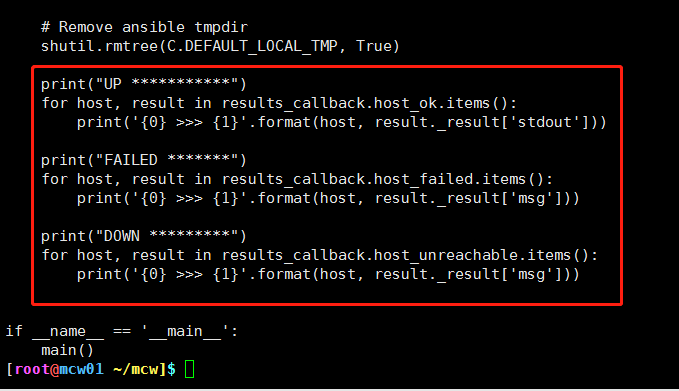
api调用程序分析(类似于runner ip)
我们只需要定义好hosts主机,主机组。然后定义好任务就可以了。如果有需要,可以对执行返回结果做些操作。:
[root@mcw01 ~/mcw]$ cat 2.9ansibleapi.py
#!/usr/bin/env python from __future__ import (absolute_import, division, print_function)
__metaclass__ = type import json
import shutil import ansible.constants as C
from ansible.executor.task_queue_manager import TaskQueueManager
from ansible.module_utils.common.collections import ImmutableDict
from ansible.inventory.manager import InventoryManager
from ansible.parsing.dataloader import DataLoader
from ansible.playbook.play import Play
from ansible.plugins.callback import CallbackBase
from ansible.vars.manager import VariableManager
from ansible import context # Create a callback plugin so we can capture the output
class ResultsCollectorJSONCallback(CallbackBase): #就是定义一个回到插件,继承回调基础类
"""A sample callback plugin used for performing an action as results come in. If you want to collect all results into a single object for processing at
the end of the execution, look into utilizing the ``json`` callback plugin
or writing your own custom callback plugin.
""" def __init__(self, *args, **kwargs):
super(ResultsCollectorJSONCallback, self).__init__(*args, **kwargs)
self.host_ok = {}
self.host_unreachable = {}
self.host_failed = {} def v2_runner_on_unreachable(self, result):
host = result._host
self.host_unreachable[host.get_name()] = result def v2_runner_on_ok(self, result, *args, **kwargs):
"""Print a json representation of the result. Also, store the result in an instance attribute for retrieval later
"""
host = result._host
self.host_ok[host.get_name()] = result
print(json.dumps({host.name: result._result}, indent=4)) #这就是我们在执行程序之后看到的结果json.成功才有 def v2_runner_on_failed(self, result, *args, **kwargs):
host = result._host
self.host_failed[host.get_name()] = result def main():
host_list = ['10.0.0.12']#定义主机['localhost', 'www.example.com', 'www.google.com']
# since the API is constructed for CLI it expects certain options to always be set in the context object
context.CLIARGS = ImmutableDict(connection='smart', module_path=['/to/mymodules', '/usr/share/ansible'], forks=10, become=None,
become_method=None, become_user=None, check=False, diff=False)
# required for
# https://github.com/ansible/ansible/blob/devel/lib/ansible/inventory/manager.py#L204
sources = ','.join(host_list)
if len(host_list) == 1:
sources += ',' #将主机以逗号分隔都拼接起来,如果只有一个数据,那么ip后面拼接个逗号
print(sources) # 结果: 10.0.0.12,
# initialize needed objects
loader = DataLoader() #打印结果<ansible.parsing.dataloader.DataLoader object at 0x1156fd0># Takes care of finding and reading yaml, json and ini files
passwords = dict(vault_pass='secret') #打印结果:{'vault_pass': 'secret'} # Instantiate our ResultsCollectorJSONCallback for handling results as they come in. Ansible expects this to be one of its main display outlets
results_callback = ResultsCollectorJSONCallback() #结果:回调函数对象 # create inventory, use path to host config file as source or hosts in a comma separated string
inventory = InventoryManager(loader=loader, sources=sources) #打印结果:inventory管理对象<ansible.inventory.manager.InventoryManager object at 0x1fe3550>
#数据加载对象,10.0.0.12,
# variable manager takes care of merging all the different sources to give you a unified view of variables available in each context
variable_manager = VariableManager(loader=loader, inventory=inventory) #变量管理对象<ansible.vars.manager.VariableManager object at 0x208d5d0> # instantiate task queue manager, which takes care of forking and setting up all objects to iterate over host list and tasks
# IMPORTANT: This also adds library dirs paths to the module loader
# IMPORTANT: and so it must be initialized before calling `Play.load()`.
tqm = TaskQueueManager( #打印结果:任务队列管理对象
inventory=inventory, #任务对象管理对象,传inventory管理对象,传变量管理对象,传数据加载对象,传密码,传回调函数对象
variable_manager=variable_manager, #上面跟我们相关的只有主机列表,其它不变就行啊。传递的参数都是刚刚定义好的
loader=loader,
passwords=passwords,
stdout_callback=results_callback, # Use our custom callback instead of the ``default`` callback plugin, which prints to stdout
) # create data structure that represents our play, including tasks, this is basically what our YAML loader does internally.
play_source = dict( #剧本源,是个字典,指定剧本名称吗?指定主机列表,指定是否需要收集facts
name="Ansible Play", #指定任务列表,任务列表中可以存放多个任务。
hosts=host_list, #这跟写剧本似的,剧本就是多个任务聚集起来的。每个任务有name,有使用哪个模块,使用了什么参数。
gather_facts='no', #这里也是这样。剧本里面还可以定义变量,循环,判断,注册变量等等,这些写法应该是不同的。如下,
tasks=[ #将任务一ls的执行结果注册为变量,变量名是shell_out。第二个任务调用这个注册变量的变量名,然后点stdout得到注册变量shell执行的标准输出
# dict(action=dict(module='shell', args='ls'), register='shell_out'),#这就是变量在任务之间的传递。可以参考写剧本,去找这个任务列表怎么实现对应功能的
# dict(action=dict(module='debug', args=dict(msg='{{shell_out.stdout}}'))), #所以我们需要在任务列表中执行任务,在hosts中定义主机和主机组。有这两个基本上
dict(action=dict(module='command', args=dict(cmd='/usr/bin/uptime'))), #就能写剧本了,实现剧本功能了。我们主要关注这两点
]
) # Create play object, playbook objects use .load instead of init or new methods,
# this will also automatically create the task objects from the info provided in play_source
play = Play().load(play_source, variable_manager=variable_manager, loader=loader) #打印结果:Ansible Play,估计是用了str方法了。
#实例化一个剧本对象,将剧本源(名字,主机,是否收集facts,有哪些剧本任务)导入到剧本对象;两变量管理对象导入到剧本对象中,将数据加载对象导入。估计内部会进行变量渲染等等之类的吧。暂时不需要关心
# Actually run it
try: #运行剧本。将剧本传入到任务队列管理里面的run方法中。这里面应该是对剧本任务进行消费。剧本对象传到任务队列里面了。里面包含了剧本需要的主机,剧本有哪些任务,剧本使用的变量等。
result = tqm.run(play) # most interesting data for a play is actually sent to the callback's methods
finally: #result打印结果好像只是个0,难道是显示执行成功的意思?我们看到执行的结果字典,应该就是在result和play之间哪里打印的。如果没有意外应该是result这里,运行剧本任务
# we always need to cleanup child procs and the structures we use to communicate with them #然后将运行结果在终端上打印出来这个结果字典
tqm.cleanup() #清理临时文件,也就是执行任务的过程中,会创建临时文件。任务执行完成,对临时文件进行清理。我们写程序也可以这样做。
if loader:
loader.cleanup_all_tmp_files() # Remove ansible tmpdir #C.DEFAULT_LOCAL_TMP是/root/.ansible/tmp/ansible-local-16916wo3RhL目录,里面有个临时文件101 /root/.ansible/tmp/ansible-tmp-1666015891.13-5454-129638497331557/AnsiballZ_command.py 。
shutil.rmtree(C.DEFAULT_LOCAL_TMP, True) print("results_callback: ",results_callback) #<__main__.ResultsCollectorJSONCallback object at 0x2858550>
print("results_callback.host_ok",results_callback.host_ok) #{'10.0.0.12': <ansible.executor.task_result.TaskResult object at 0x203dd90>}
print("results_callback.host_ok.items: ",results_callback.host_ok.items()) #[('10.0.0.12', <ansible.executor.task_result.TaskResult object at 0x203dd90>)]
for host, result in results_callback.host_ok.items():
print(host,result) #10.0.0.12 <ansible.executor.task_result.TaskResult object at 0x203dd90>
print("result._result: ",result._result)
print("结果对象里找表准输出,就是剧本执行的输出信息,这里就是命令uptime的执行打印结果: ",result._result['stdout']) {'stderr_lines': [], u'cmd': [u'/usr/bin/uptime'], u'end': u'2022-10-24 00:31:38.590871', '_ansible_no_log': False, u'stdout': u' 00:31:38 up 1 day, 8:49, 2 users, load average: 0.00, 0.01, 0.05', u'changed': True, u'rc': 0, u'start': u'2022-10-24 00:31:38.580309', u'stderr': u'', u'delta': u'0:00:00.010562', u'invocation': {u'module_args': {u'creates': None, u'executable': None, u'_uses_shell': False, u'strip_empty_ends': True, u'_raw_params': u'/usr/bin/uptime', u'removes': None, u'argv': None, u'warn': True, u'chdir': None, u'stdin_add_newline': True, u'stdin': None}}, 'stdout_lines': [u' 00:31:38 up 1 day, 8:49, 2 users, load average: 0.00, 0.01, 0.05'], 'ansible_facts': {u'discovered_interpreter_python': u'/usr/bin/python'}} 将数据整理如下:
{'stderr_lines': [],
u'cmd': [u'/usr/bin/uptime'],
u'end': u'2022-10-24 00:31:38.590871',
'_ansible_no_log': False,
u'stdout': u' 00:31:38 up 1 day, 8:49, 2 users, load average: 0.00, 0.01, 0.05',
u'changed': True,
u'rc': 0,
u'start': u'2022-10-24 00:31:38.580309',
u'stderr': u'',
u'delta': u'0:00:00.010562',
u'invocation': {
u'module_args': {u'creates': None,
u'executable': None,
u'_uses_shell': False,
u'strip_empty_ends': True,
u'_raw_params': u'/usr/bin/uptime',
u'removes': None,
u'argv': None,
u'warn': True,
u'chdir': None,
u'stdin_add_newline': True,
u'stdin': None
}
},
'stdout_lines': [u' 00:31:38 up 1 day, 8:49, 2 users, load average: 0.00, 0.01, 0.05'],
'ansible_facts': {u'discovered_interpreter_python': u'/usr/bin/python'}}
上面是result._result打印出来的。也就是我们需要指定的键,直接字典的方式取值就行了。标准输出就是命令的结果。回调函数,运行ok下面打印的也是这个 print("UP ***********")
for host, result in results_callback.host_ok.items():
print('{0} >>> {1}'.format(host, result._result['stdout'])) print("FAILED *******")
for host, result in results_callback.host_failed.items():
#当我们的任务里面dict(action=dict(module='command', args=dict(cmd='cat /usr/bin/uptimebbb'))),查看不存在的文件匹配到失败时。打印信息如下
print('{0} >>> {1}'.format(host, result._result['msg'])) #10.0.0.12 >>> non-zero return code
print("失败:",result._result)
失败: {'stderr_lines': [u'cat: /usr/bin/uptimebbb: No such file or directory'], u'cmd': [u'cat', u'/usr/bin/uptimebbb'], u'stdout': u'', u'msg': u'non-zero return code', u'delta': u'0:00:00.011209', 'stdout_lines': [], 'ansible_facts': {u'discovered_interpreter_python': u'/usr/bin/python'}, u'end': u'2022-10-24 00:44:23.455248', '_ansible_no_log': False, u'changed': True, u'start': u'2022-10-24 00:44:23.444039', u'stderr': u'cat: /usr/bin/uptimebbb: No such file or directory', u'rc': 1, u'invocation': {u'module_args': {u'creates': None, u'executable': None, u'_uses_shell': False, u'strip_empty_ends': True, u'_raw_params': u'cat /usr/bin/uptimebbb', u'removes': None, u'argv': None, u'warn': True, u'chdir': None, u'stdin_add_newline': True, u'stdin': None}}} 整理如下:我们这里定义打印的是msg.,
{'stderr_lines': [u'cat: /usr/bin/uptimebbb: No such file or directory'],
u'cmd': [u'cat', u'/usr/bin/uptimebbb'],
u'stdout': u'',
u'msg': u'non-zero return code',
u'delta': u'0:00:00.011209',
'stdout_lines': [],
'ansible_facts': {u'discovered_interpreter_python': u'/usr/bin/python'},
u'end': u'2022-10-24 00:44:23.455248',
'_ansible_no_log': False,
u'changed': True,
u'start': u'2022-10-24 00:44:23.444039',
u'stderr': u'cat: /usr/bin/uptimebbb: No such file or directory',
u'rc': 1,
u'invocation': {
u'module_args': {u'creates': None,
u'executable': None,
u'_uses_shell': False,
u'strip_empty_ends': True,
u'_raw_params': u'cat /usr/bin/uptimebbb',
u'removes': None,
u'argv': None,
u'warn': True,
u'chdir': None,
u'stdin_add_newline': True,
u'stdin': None}} } print("DOWN *********")
for host, result in results_callback.host_unreachable.items():
print('{0} >>> {1}'.format(host, result._result['msg'])) if __name__ == '__main__':
main()
[root@mcw01 ~/mcw]$
2.9传参的方式,执行命令,实现runner api。
[root@mcw01 ~/mcw]$ cat mytest.py
# _*_ coding:utf-8 __*__
# !/usr/bin/env python from __future__ import (absolute_import, division, print_function) __metaclass__ = type import json
import shutil import ansible.constants as C
from ansible.executor.task_queue_manager import TaskQueueManager
from ansible.module_utils.common.collections import ImmutableDict
from ansible.inventory.manager import InventoryManager
from ansible.parsing.dataloader import DataLoader
from ansible.playbook.play import Play
from ansible.plugins.callback import CallbackBase
from ansible.vars.manager import VariableManager
from ansible import context # Create a callback plugin so we can capture the output
class ResultsCollectorJSONCallback(CallbackBase):
"""A sample callback plugin used for performing an action as results come in. If you want to collect all results into a single object for processing at
the end of the execution, look into utilizing the ``json`` callback plugin
or writing your own custom callback plugin.
""" def __init__(self, *args, **kwargs):
super(ResultsCollectorJSONCallback, self).__init__(*args, **kwargs)
self.host_ok = {}
self.host_unreachable = {}
self.host_failed = {} def v2_runner_on_unreachable(self, result):
host = result._host
self.host_unreachable[host.get_name()] = result def v2_runner_on_ok(self, result, *args, **kwargs):
"""Print a json representation of the result. Also, store the result in an instance attribute for retrieval later
"""
host = result._host
self.host_ok[host.get_name()] = result
print(json.dumps({host.name: result._result}, indent=4)) def v2_runner_on_failed(self, result, *args, **kwargs):
host = result._host
self.host_failed[host.get_name()] = result def main(host_list,module_name,module_args):
host_list = host_list # ['localhost', 'www.example.com', 'www.google.com']
# since the API is constructed for CLI it expects certain options to always be set in the context object
context.CLIARGS = ImmutableDict(connection='smart', module_path=['/to/mymodules', '/usr/share/ansible'], forks=10,
become=None,
become_method=None, become_user=None, check=False, diff=False)
# required for
# https://github.com/ansible/ansible/blob/devel/lib/ansible/inventory/manager.py#L204
sources = ','.join(host_list)
if len(host_list) == 1:
sources += ','
# initialize needed objects
loader = DataLoader() # Takes care of finding and reading yaml, json and ini files
passwords = dict(vault_pass='secret')
# Instantiate our ResultsCollectorJSONCallback for handling results as they come in. Ansible expects this to be one of its main display outlets
results_callback = ResultsCollectorJSONCallback() # create inventory, use path to host config file as source or hosts in a comma separated string
inventory = InventoryManager(loader=loader, sources=sources) # variable manager takes care of merging all the different sources to give you a unified view of variables available in each context
variable_manager = VariableManager(loader=loader, inventory=inventory) # instantiate task queue manager, which takes care of forking and setting up all objects to iterate over host list and tasks
# IMPORTANT: This also adds library dirs paths to the module loader
# IMPORTANT: and so it must be initialized before calling `Play.load()`.
tqm = TaskQueueManager(
inventory=inventory,
variable_manager=variable_manager,
loader=loader,
passwords=passwords,
stdout_callback=results_callback,
# Use our custom callback instead of the ``default`` callback plugin, which prints to stdout
) # create data structure that represents our play, including tasks, this is basically what our YAML loader does internally.
play_source = dict(
name="Ansible Play",
hosts=host_list,
gather_facts='no',
tasks=[
# dict(action=dict(module='shell', args='ls'), register='shell_out'),
# dict(action=dict(module='debug', args=dict(msg='{{shell_out.stdout}}'))),
# dict(action=dict(module='command', args=dict(cmd='cat /usr/bin/uptimebbb'))),
dict(action=dict(module=module_name, args=module_args)),
]
) # Create play object, playbook objects use .load instead of init or new methods,
# this will also automatically create the task objects from the info provided in play_source
play = Play().load(play_source, variable_manager=variable_manager, loader=loader)
# Actually run it
try:
result = tqm.run(play) # most interesting data for a play is actually sent to the callback's methods
finally:
# we always need to cleanup child procs and the structures we use to communicate with them
tqm.cleanup()
if loader:
loader.cleanup_all_tmp_files() # Remove ansible tmpdir
shutil.rmtree(C.DEFAULT_LOCAL_TMP, True) print("UP ***********")
for host, result in results_callback.host_ok.items():
print('{0} >>> {1}'.format(host, result._result['stdout'])) print("FAILED *******")
for host, result in results_callback.host_failed.items():
print('{0} >>> {1}'.format(host, result._result['msg']))
print("失败:", result._result)
print("DOWN *********")
for host, result in results_callback.host_unreachable.items():
print('{0} >>> {1}'.format(host, result._result['msg']))
print("不可达:", result._result) if __name__ == '__main__':
option_dict={"become":True,"remote_user":"root"}
module_name = 'shell'
module_args = "/usr/bin/uptime"
host_list = ['10.0.0.11','10.0.0.12']
main(host_list,module_name,module_args) [root@mcw01 ~/mcw]$
执行结果:
[root@mcw01 ~/mcw]$ python mytest.py
{
"10.0.0.12": {
"stderr_lines": [],
"cmd": "/usr/bin/uptime",
"end": "2022-10-24 01:28:10.831660",
"_ansible_no_log": false,
"stdout": " 01:28:10 up 1 day, 9:46, 2 users, load average: 0.00, 0.01, 0.05",
"changed": true,
"rc": 0,
"start": "2022-10-24 01:28:10.820105",
"stderr": "",
"delta": "0:00:00.011555",
"invocation": {
"module_args": {
"creates": null,
"executable": null,
"_uses_shell": true,
"strip_empty_ends": true,
"_raw_params": "/usr/bin/uptime",
"removes": null,
"argv": null,
"warn": true,
"chdir": null,
"stdin_add_newline": true,
"stdin": null
}
},
"stdout_lines": [
" 01:28:10 up 1 day, 9:46, 2 users, load average: 0.00, 0.01, 0.05"
],
"ansible_facts": {
"discovered_interpreter_python": "/usr/bin/python"
}
}
}
{
"10.0.0.11": {
"stderr_lines": [],
"cmd": "/usr/bin/uptime",
"end": "2022-10-24 01:28:11.153952",
"_ansible_no_log": false,
"stdout": " 01:28:11 up 1 day, 9:46, 4 users, load average: 0.68, 0.31, 0.24",
"changed": true,
"rc": 0,
"start": "2022-10-24 01:28:11.093208",
"stderr": "",
"delta": "0:00:00.060744",
"invocation": {
"module_args": {
"creates": null,
"executable": null,
"_uses_shell": true,
"strip_empty_ends": true,
"_raw_params": "/usr/bin/uptime",
"removes": null,
"argv": null,
"warn": true,
"chdir": null,
"stdin_add_newline": true,
"stdin": null
}
},
"stdout_lines": [
" 01:28:11 up 1 day, 9:46, 4 users, load average: 0.68, 0.31, 0.24"
],
"ansible_facts": {
"discovered_interpreter_python": "/usr/bin/python"
}
}
}
UP ***********
10.0.0.11 >>> 01:28:11 up 1 day, 9:46, 4 users, load average: 0.68, 0.31, 0.24
10.0.0.12 >>> 01:28:10 up 1 day, 9:46, 2 users, load average: 0.00, 0.01, 0.05
FAILED *******
DOWN *********
[root@mcw01 ~/mcw]$
打印的东西就是我们程序能实实现的一个功能
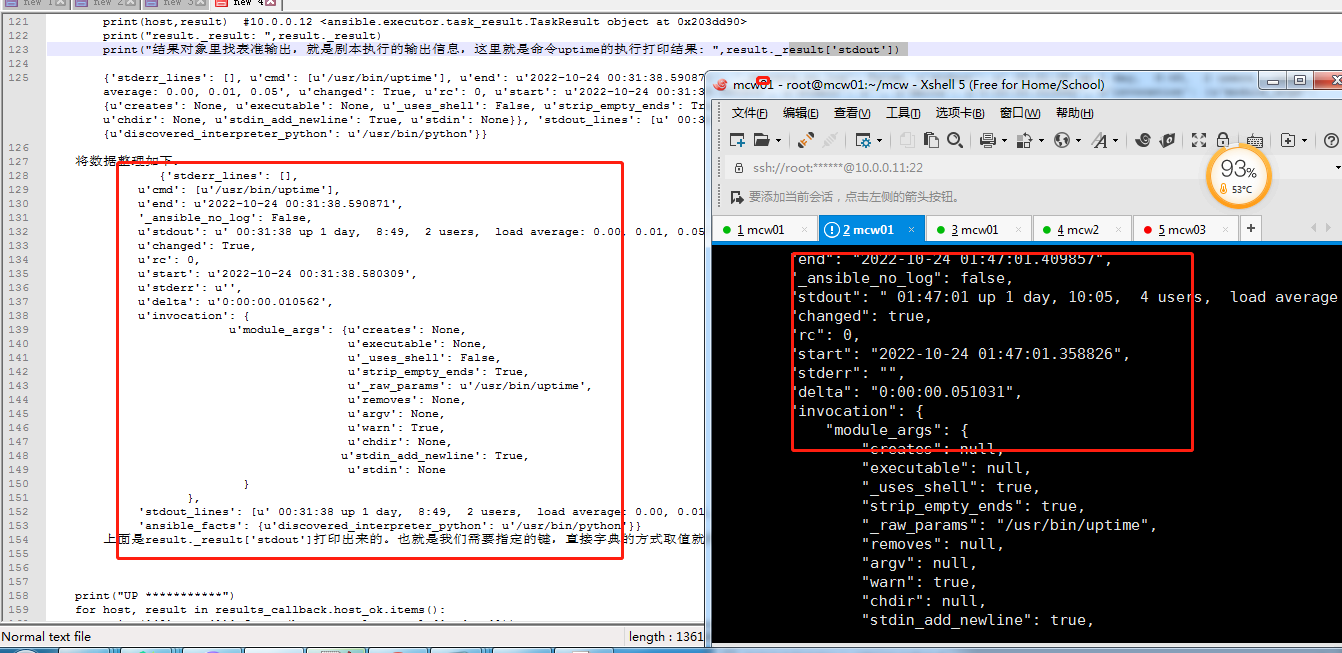
ansible 1.9.6 api调用
runner api 简单调用案例,以及Runner类的初始化参数大全
程序:
import ansible.runner
runner=ansible.runner.Runner(module_name='shell',module_args='hostname',pattern='all',forks=10)
result=runner.run()
for host,ret in result['contacted'].items():
print(host,ret['stdout'])
只需要将模块名字,你用的参数,以及主机和主机组传进来就可以了。因为ad-hoc模式有这三个就可以使用了。想要更多信息那就看它的其它参数
执行结果

我将源码Runner类的参数放到下面,供参数设置使用
class Runner(object):
''' core API interface to ansible ''' # see bin/ansible for how this is used... def __init__(self,
host_list=C.DEFAULT_HOST_LIST, # ex: /etc/ansible/hosts, legacy usage
module_path=None, # ex: /usr/share/ansible
module_name=C.DEFAULT_MODULE_NAME, # ex: copy
module_args=C.DEFAULT_MODULE_ARGS, # ex: "src=/tmp/a dest=/tmp/b"
forks=C.DEFAULT_FORKS, # parallelism level
timeout=C.DEFAULT_TIMEOUT, # SSH timeout
pattern=C.DEFAULT_PATTERN, # which hosts? ex: 'all', 'acme.example.org'
remote_user=C.DEFAULT_REMOTE_USER, # ex: 'username'
remote_pass=C.DEFAULT_REMOTE_PASS, # ex: 'password123' or None if using key
remote_port=None, # if SSH on different ports
private_key_file=C.DEFAULT_PRIVATE_KEY_FILE, # if not using keys/passwords
background=0, # async poll every X seconds, else 0 for non-async
basedir=None, # directory of playbook, if applicable
setup_cache=None, # used to share fact data w/ other tasks
vars_cache=None, # used to store variables about hosts
transport=C.DEFAULT_TRANSPORT, # 'ssh', 'paramiko', 'local'
conditional='True', # run only if this fact expression evals to true
callbacks=None, # used for output
module_vars=None, # a playbooks internals thing
play_vars=None, #
play_file_vars=None, #
role_vars=None, #
role_params=None, #
default_vars=None, #
extra_vars=None, # extra vars specified with he playbook(s)
is_playbook=False, # running from playbook or not?
inventory=None, # reference to Inventory object
subset=None, # subset pattern
check=False, # don't make any changes, just try to probe for potential changes
diff=False, # whether to show diffs for template files that change
environment=None, # environment variables (as dict) to use inside the command
complex_args=None, # structured data in addition to module_args, must be a dict
error_on_undefined_vars=C.DEFAULT_UNDEFINED_VAR_BEHAVIOR, # ex. False
accelerate=False, # use accelerated connection
accelerate_ipv6=False, # accelerated connection w/ IPv6
accelerate_port=None, # port to use with accelerated connection
vault_pass=None,
run_hosts=None, # an optional list of pre-calculated hosts to run on
no_log=False, # option to enable/disable logging for a given task
run_once=False, # option to enable/disable host bypass loop for a given task
become=False, # whether to run privelege escalation or not
become_method=C.DEFAULT_BECOME_METHOD,
become_user=C.DEFAULT_BECOME_USER, # ex: 'root'
become_pass=C.DEFAULT_BECOME_PASS, # ex: 'password123' or None
become_exe=C.DEFAULT_BECOME_EXE, # ex: /usr/local/bin/sudo
): # used to lock multiprocess inputs and outputs at various levels
self.output_lockfile = OUTPUT_LOCKFILE
self.process_lockfile = PROCESS_LOCKFILE if not complex_args:
complex_args = {} # storage & defaults
self.check = check
self.diff = diff
self.setup_cache = utils.default(setup_cache, lambda: ansible.cache.FactCache())
self.vars_cache = utils.default(vars_cache, lambda: collections.defaultdict(dict))
self.basedir = utils.default(basedir, lambda: os.getcwd())
self.callbacks = utils.default(callbacks, lambda: DefaultRunnerCallbacks())
self.generated_jid = str(random.randint(0, 999999999999))
self.transport = transport
self.inventory = utils.default(inventory, lambda: ansible.inventory.Inventory(host_list)) self.module_vars = utils.default(module_vars, lambda: {})
self.play_vars = utils.default(play_vars, lambda: {})
self.play_file_vars = utils.default(play_file_vars, lambda: {})
self.role_vars = utils.default(role_vars, lambda: {})
self.role_params = utils.default(role_params, lambda: {})
self.default_vars = utils.default(default_vars, lambda: {})
self.extra_vars = utils.default(extra_vars, lambda: {}) self.always_run = None
self.connector = connection.Connector(self)
self.conditional = conditional
self.delegate_to = None
self.module_name = module_name
self.forks = int(forks)
self.pattern = pattern
self.module_args = module_args
self.timeout = timeout
self.remote_user = remote_user
self.remote_pass = remote_pass
self.remote_port = remote_port
self.private_key_file = private_key_file
self.background = background
self.become = become
self.become_method = become_method
self.become_user_var = become_user
self.become_user = None
self.become_pass = become_pass
self.become_exe = become_exe
self.is_playbook = is_playbook
self.environment = environment
self.complex_args = complex_args
self.error_on_undefined_vars = error_on_undefined_vars
self.accelerate = accelerate
self.accelerate_port = accelerate_port
self.accelerate_ipv6 = accelerate_ipv6
self.callbacks.runner = self
self.omit_token = '__omit_place_holder__%s' % sha1(os.urandom(64)).hexdigest()
self.vault_pass = vault_pass
self.no_log = no_log
self.run_once = run_once
我们直接打印结果json数据。刚刚是取了标准输出了。
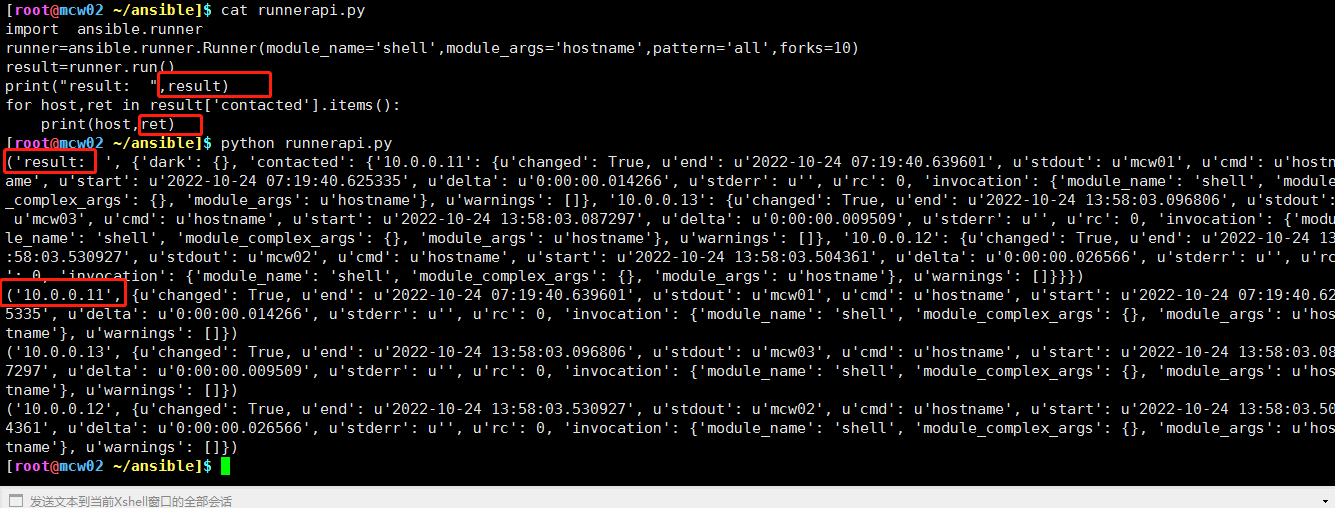
result是如下字典。多个主机的执行情况
{'dark': {}, 'contacted': {
'10.0.0.11': {u'changed': True, u'end': u'2022-10-24 07:19:40.639601', u'stdout': u'mcw01', u'cmd': u'hostname',
u'start': u'2022-10-24 07:19:40.625335', u'delta': u'0:00:00.014266', u'stderr': u'', u'rc': 0,
'invocation': {'module_name': 'shell', 'module_complex_args': {}, 'module_args': u'hostname'},
u'warnings': []},
'10.0.0.13': {u'changed': True, u'end': u'2022-10-24 13:58:03.096806', u'stdout': u'mcw03', u'cmd': u'hostname',
u'start': u'2022-10-24 13:58:03.087297', u'delta': u'0:00:00.009509', u'stderr': u'', u'rc': 0,
'invocation': {'module_name': 'shell', 'module_complex_args': {}, 'module_args': u'hostname'},
u'warnings': []},
'10.0.0.12': {u'changed': True, u'end': u'2022-10-24 13:58:03.530927', u'stdout': u'mcw02', u'cmd': u'hostname',
u'start': u'2022-10-24 13:58:03.504361', u'delta': u'0:00:00.026566', u'stderr': u'', u'rc': 0,
'invocation': {'module_name': 'shell', 'module_complex_args': {}, 'module_args': u'hostname'},
u'warnings': []}}}
ret单个主机的信息如下:
{'10.0.0.11':
{u'changed': True,
u'end': u'2022-10-24 07:19:40.639601',
u'stdout': u'mcw01',
u'cmd': u'hostname',
u'start': u'2022-10-24 07:19:40.625335',
u'delta': u'0:00:00.014266',
u'stderr': u'',
u'rc': 0,
'invocation': {
'module_name': 'shell',
'module_complex_args': {},
'module_args': u'hostname'
},
u'warnings': []
}
}
按理说错误信息放到dark里面了。但是我这里收不到错误信息。
runner api 不只是打印成功的,还打印执行失败的错误信息
import sys
sys.path.append("/root/untitled6/Lib/site-packages")
import ansible.runner
runner=ansible.runner.Runner(module_name='shell',host_list="/root/hosts",module_args='hostname',pattern='all',forks=10)
result=runner.run()
print(result)
print("##############################")
for host,ret in result['contacted'].items():
print(host,ret['stdout'])
for host,ret in result['dark'].items():
print(host,ret['msg'])

playbook api
[root@mcw02 ~/ansible]$ cat key.yaml
- hosts: "{{ hosts }}"
gather_facts: false
tasks:
- name: key
authorized_key: user=root key="{{ lookup('file','/root/.ssh/id_rsa.pub') }}"
[root@mcw02 ~/ansible]$ cat playapi.py #api.
from ansible.inventory import Inventory
from ansible.playbook import PlayBook
from ansible import callbacks
inventory=Inventory('./hosts')
stats=callbacks.AggregateStats()
playbook_cb=callbacks.PlaybookCallbacks()
runner_cb=callbacks.PlaybookRunnerCallbacks(stats)
results=PlayBook(playbook='key.yaml',callbacks=playbook_cb,runner_callbacks=runner_cb,stats=stats,inventory=inventory,extra_vars={'hosts':'all'})
res=results.run()
print(res)
[root@mcw02 ~/ansible]$
如下,确实调用了剧本key。yaml。我们传递的变量给模板,是所有主机,也是生效的。打印结果是json数据。我们指定了inventory文件。剧本实现了公钥分发到其它主机,将本机公钥写入了其它主机.ssh/authorized_keys中

返回的结果有点简单
{'10.0.0.11': {'unreachable': 0, 'skipped': 0, 'ok': 1, 'changed': 1, 'failures': 0},
'10.0.0.13': {'unreachable': 0, 'skipped': 0, 'ok': 1, 'changed': 1, 'failures': 0},
'10.0.0.12': {'unreachable': 1, 'skipped': 0, 'ok': 0, 'changed': 0, 'failures': 0}}
使用flask封装我们的api,提供http远程执行ansible命令
效果
我们的程序运行在主机2上
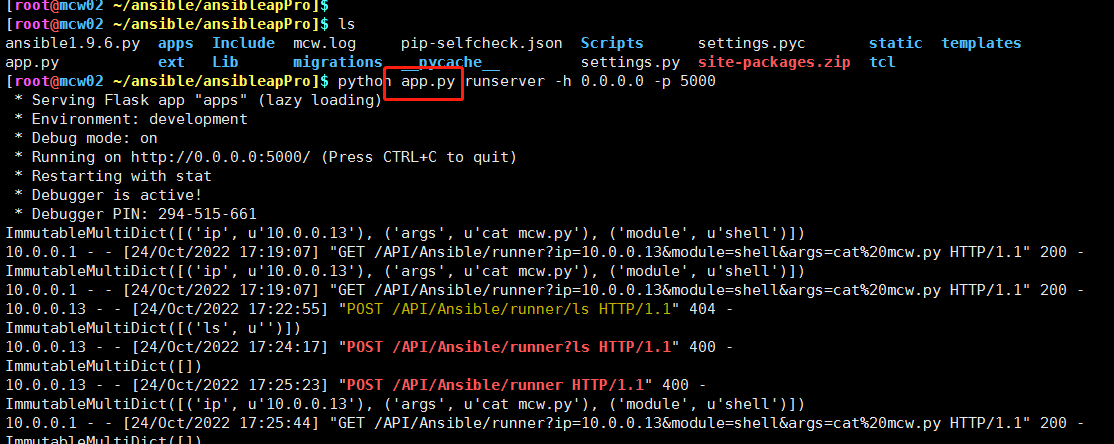
我们在主机3上执行curl命令访问接口,让主机2上的程序查主机3上的文件,成功返回执行结果,与主机3上的文件一致
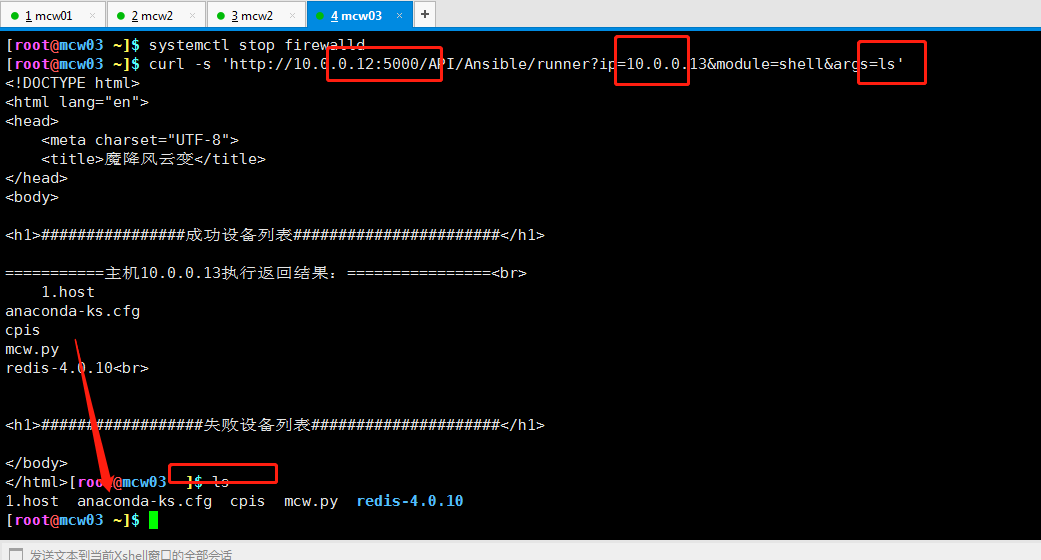
我们在浏览器上访问接口,成功返回数据

此时,主机2是我们flask程序所在主机,也是ansible的主控机。我们可以通过http形式,在主机2上执行ad-hoc命令,使用各种模块。这就是使用flask封装了ansible的runner
api效果。下面我们看其他的。我们已经知道主机3中有mcw.py,那么我们看一下文件内容。我们可以看到跟主机上是一样的。由此我们就能通过写前端页面,进行各种post和get请求,是对ansible api的请求,那么我们在网页上可以实现管理一群机器了。也可以用ansible写控制台
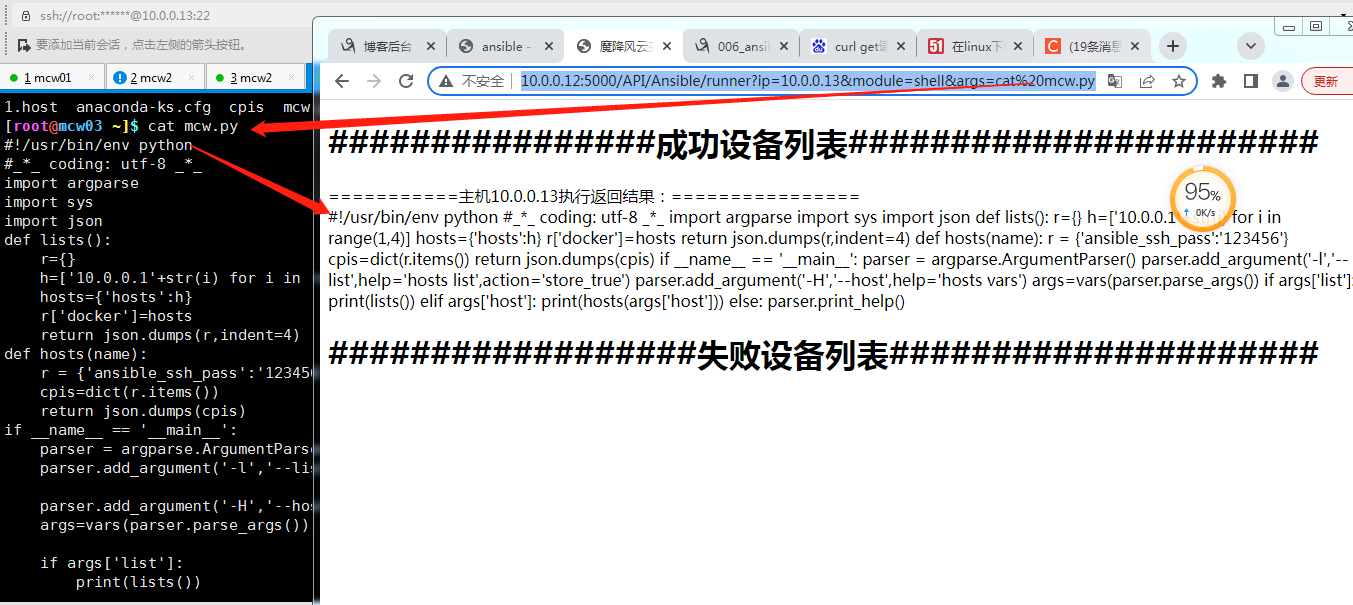
我们根据调用剧本api,传的是剧本名称。后端会根据路径拼接成yaml文件。然后调用剧本api执行剧本。如果没有写路径,默认会从项目根路径找文件,如下。如果写了路径,就会找该路径下的文件
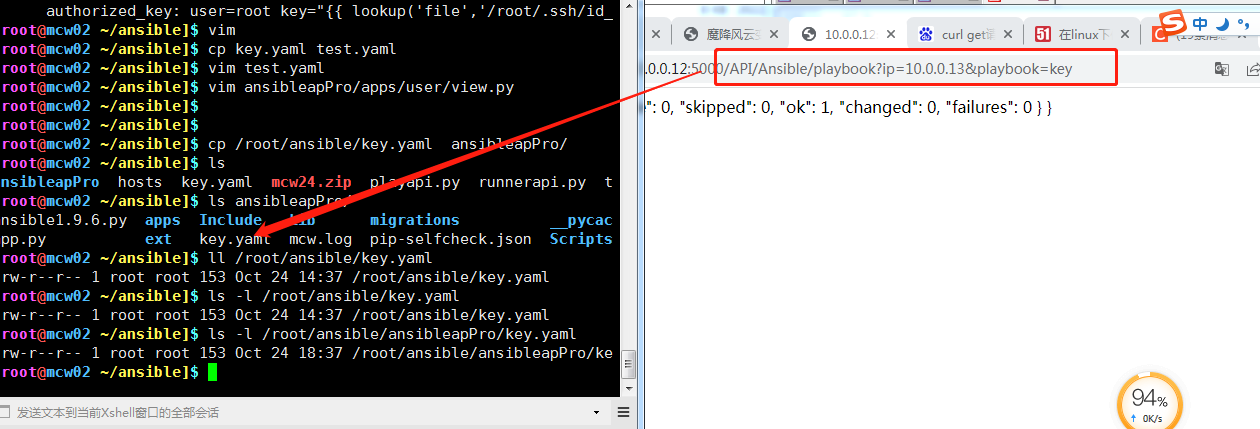


程序
下面就是flask蓝图
#_*_ coding:utf-8 __*__
from flask import Blueprint,request, render_template, redirect,abort
from apps.user.models import User
from ext import db import json
import ansible.runner
from ansible.inventory import Inventory
from ansible.playbook import PlayBook
from ansible import callbacks ansibleAPI_bp=Blueprint('ansibleAPI',__name__) @ansibleAPI_bp.route('/',methods=['GET','POST'])
def index():
return 'ok' hostfile='/root/ansible/hosts'
@ansibleAPI_bp.route('/API/Ansible/playbook',methods=['GET','POST'])
def Playbook():
"""
http://127.0.0.1:5000/API/Asible/playbook?ip=2.2.2.2&playbook=test
:return:
"""
print(request.args.get('playbook'))
vars={}
inventory = Inventory(hostfile)
stats = callbacks.AggregateStats()
playbook_cb = callbacks.PlaybookCallbacks()
runner_cb = callbacks.PlaybookRunnerCallbacks(stats)
hosts=request.args.get('ip')
task=request.args.get('playbook')
vars['hosts']=hosts
play=task+'.yaml'
results = PlayBook(playbook=play, callbacks=playbook_cb, runner_callbacks=runner_cb, stats=stats,
inventory=inventory, extra_vars=vars )
res = results.run()
return json.dumps(res,indent=4)
@ansibleAPI_bp.route('/API/Ansible/runner',methods=['GET','POST'])
def Runner():
"""
curl -H "Conten-Type: application/json" -X POST -d '{"ip":"1.1.1.1","module":"shell","args":"ls -l"}' http://127.0.0.1:5000/API/Ansible/runner
:return:
"""
print(request.args)
hosts=request.args.get('ip',None)
module=request.args.get('module',None)
args=request.args.get('args',None)
if hosts is None or module is None or args is None:
abort(400)
runner = ansible.runner.Runner(module_name=module, module_args=args, pattern=hosts, forks=10,host_list=hostfile)
tasks= runner.run()
cpis={}
cpis1={}
for (hostname, result) in tasks['contacted'].items():
if not 'failed' in result:
cpis[hostname]=result['stdout']
for (hostname, result) in tasks['dark'].items():
cpis1[hostname]=result['msg']
return render_template('ansibleApi/cpis.html',cpis=cpis,cpis1=cpis1)
下面是前端程序cpis.html
<!DOCTYPE html>
<html lang="en">
<head>
<meta charset="UTF-8">
<title>魔降风云变</title>
</head>
<body> <h1>################成功设备列表#######################</h1>
{% for k,v in cpis.items() %}
===========主机{{ k }}执行返回结果:================<br>
{{ v }}<br>
{% endfor %} <h1>##################失败设备列表#####################</h1>
{% for a,b in cpis1.items() %}
===========主机{{ a }}执行返回结果================<br>
{{ b }}<br>
{% endfor %}
</body>
</html>
ansible 1.9 api 复制即用,不影响系统原有环境
需要用到sys.path.append(“..“),可以了解这里:https://blog.csdn.net/universe_R/article/details/123370672
遇到的问题,当我们appen加入到sys.path中后,依然找不到模块:
此时我打印sys.path查看到默认的搜索路径,根据默认的包搜索路径过滤找到了其他人安装的ansibe 2.9的包。也就是没有找到包,因为这个包的搜索顺序在前,那么我们将我们的1.9的包路径insert到列表中第一个元素前。
经过测试,当我们执行程序时,打印出的sys.path会添加程序执行当前目录,然后添加上我们insert或者append进去的路径,我们让自己的程序sleep多运行一会 ;在另外一处,我们隔两秒打印一次sys.path,发现并没有正在运行的程序添加的路径。也就是说,执行python程序,有公共的包搜索路径,如果你执行的程序加入了其它的包搜索路径是不会影响公共的python路径的,我们程序加进去的包路是临时加进去,只对当前执行的程序生效,对其它程序是没有影响的。也就是说,我们使用sys.path.append 或者是insert是安全的,不会因为当前程序的搜索包路径的优先级对其它可能存在的python程序产生影响,因为加进去的路径只对当前程序生效


import sys
sys.path.append("/root/untitled6/Lib/site-packages")
import ansible.runner
runner=ansible.runner.Runner(module_name='shell',host_list="/root/hosts",module_args='hostname',pattern='all',forks=10)
result=runner.run()
print(result)
print("##############################")
for host,ret in result['contacted'].items():
print(host,ret['stdout'])
for host,ret in result['dark'].items():
print(host,ret['msg'])
首先我们看一下pycharm中环境。untitled6是windows上pycharm创建的一个项目,带有虚拟环境的。在pycharm中安装ansibe包失败,但是ansible依赖包已经装上了。在centos7虚拟机上源码包安装了ansibe 1.9,我们从python2.7的包目录下把ansibe包拷贝到笔记本的untitled6的虚拟环境包目录下了。也就是有了如下的ansibe包
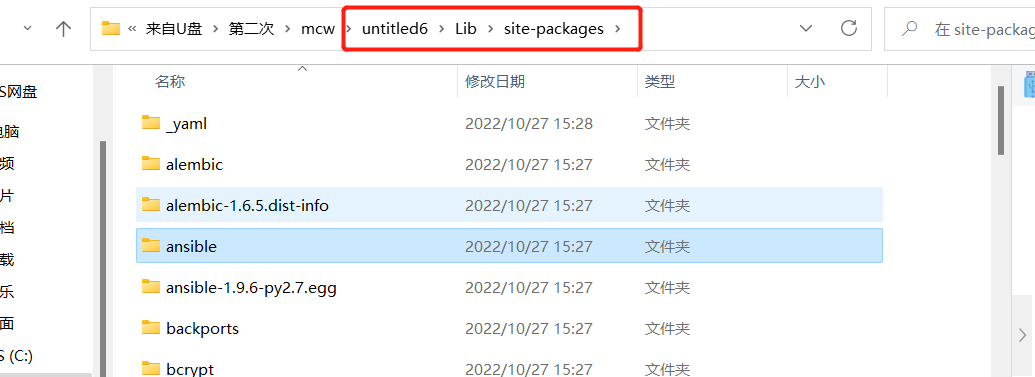
接下来我们看我们下面需要操作的Linux服务器。我们新装了三个虚拟机。目前是没有ansible的。我是提前将主机1的公钥分发到主机2和3上了,然后免密第一次登录上2和3.不太确定是否需要设置好免密。我们接下来想要将上面的项目拷贝到Linux服务器中使用。
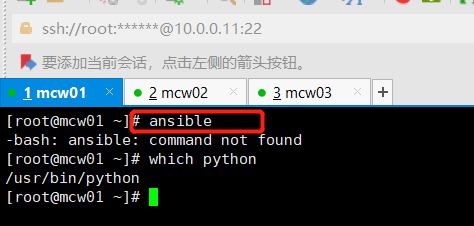
将项目解压下来

由于项目的虚拟环境python解释器是windows版本的,所以我们只能用一下Linux上原本的python解释器。后面可以考虑,虚拟环境中如何替换成Linux版python解释器,解除对别处资源的依赖性。
这里用Linux自身的装的python2.7执行我们写的一个简单程序,去调用ansibe api,发现无法导入模块。既然它找不到,那么我们就在执行这个文件之前指定它还能去哪里找包
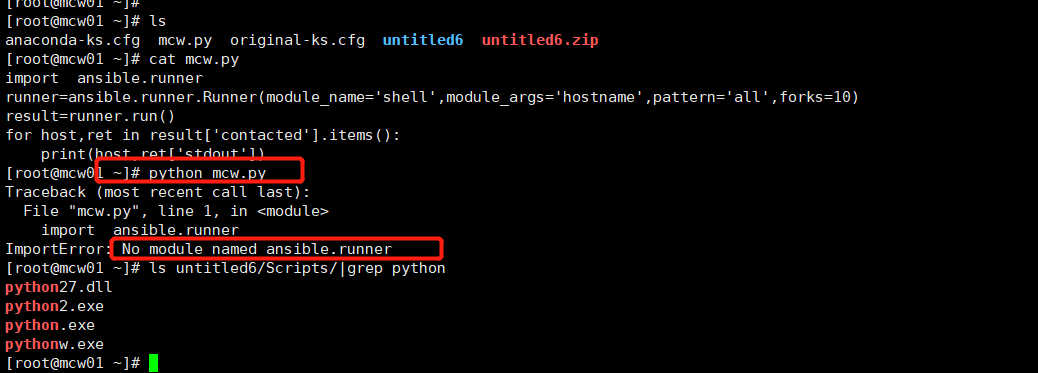
将项目的包目录追加到Linux安装的python2.7找包的列表中去。让这个解释器能找到我们项目的包。结果是找到的,但是没有inventory文件,那么我们就创建一个
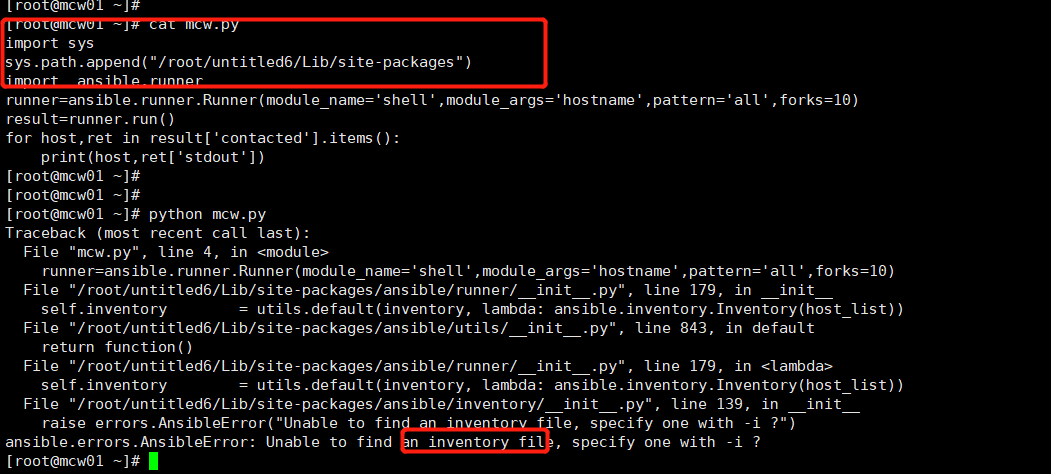
查看源码我们发现,这个参数应该是inventory文件,下面其实还有一个参数,但是注释是对象。而我们需要传的是文件。
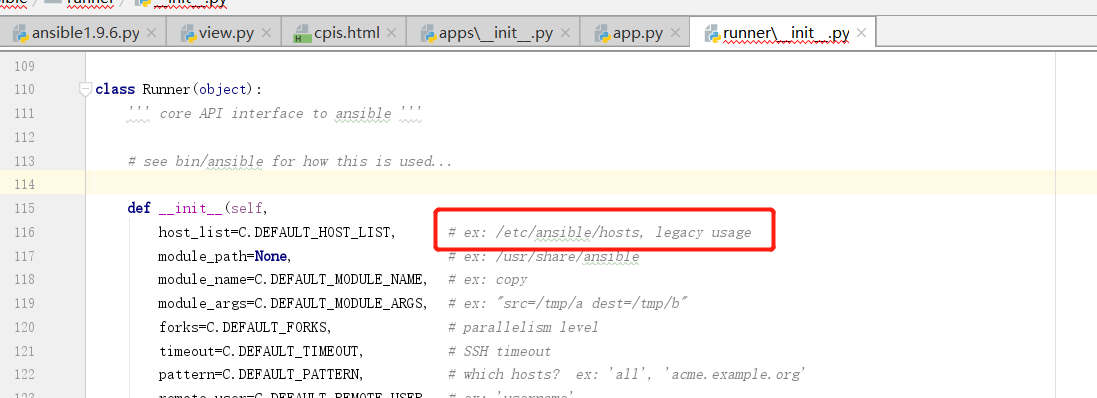
如下,我们成功获取到各个主机的信息。由于我们主机1没有对连接自身做免密,所以这里就不能访问执行。由此可知,这点和ansible软件还是一样的,都需要免密。而这里我们没有在Linux上安装ansible,用的只是可以使用的python解释器,这个解释器指定路径的方式让它能找到我们项目虚拟环境中的ansibe包路径、,如果便可以使用ansibe api去执行ansibe命令了。所以即使原系统环境中有yum安装的ansibe,不管是啥版本,和我们调用ansibe api是没有关系 的,。
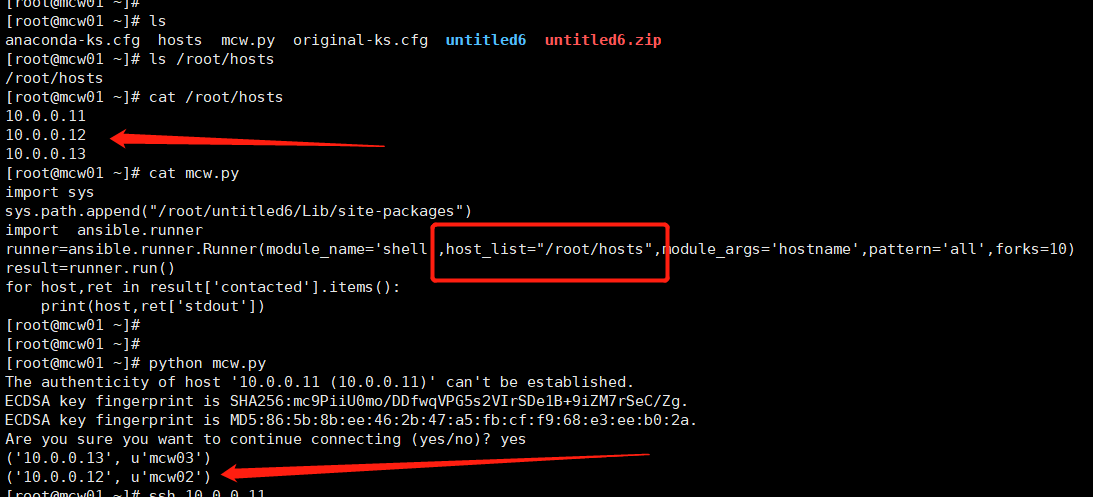
ansible其他一些使用总结
命令执行结果按原样换行
执行命令获得的结果,不是单行字符串显示,而是让它像终端执行命令一样多行展示
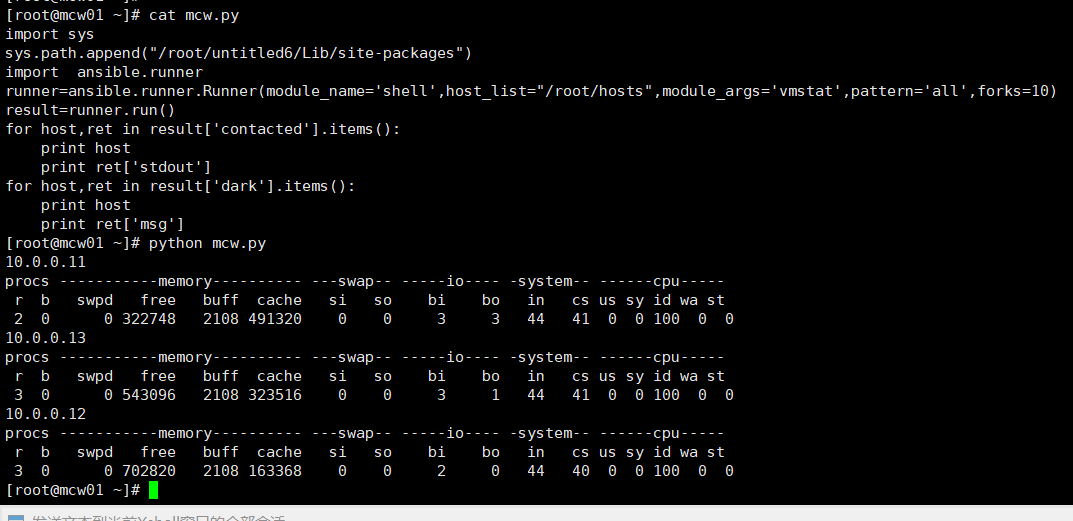
api 调用,获取命令执行结果的指定行和列数据。比如通过vmstat获取cpu使用率
shell命令取好值
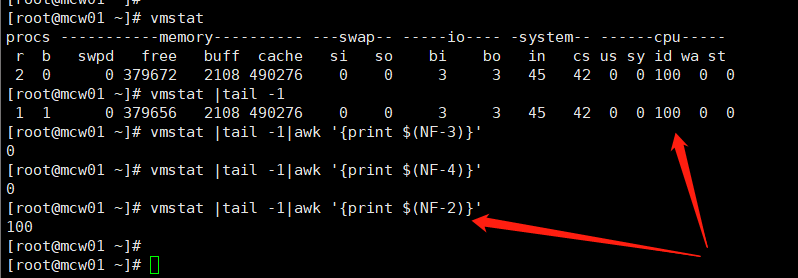
根据命令获取到指定数据,然后处理数据,100减去cpu空闲的再除以100,获得cpu使用率。
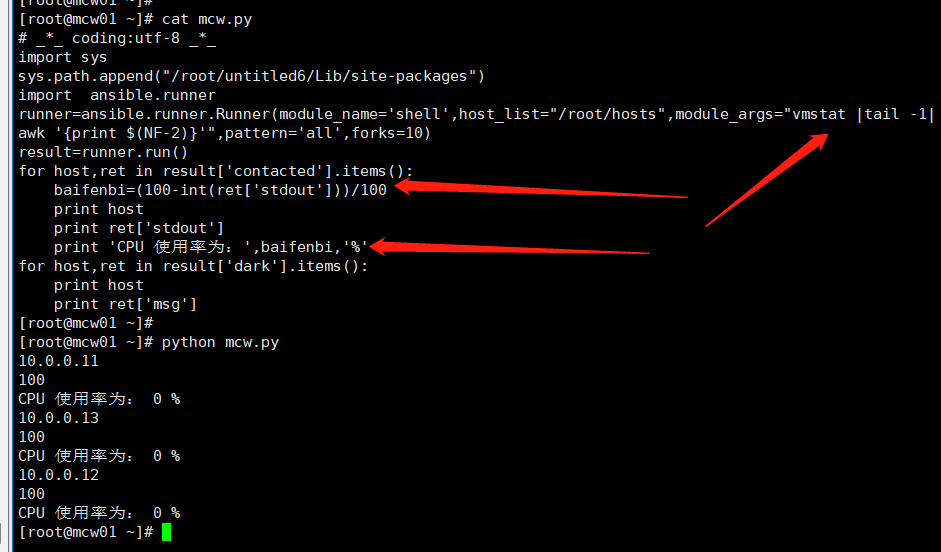
api 第二种方式获取CPU使用率(shell输出指定行和指定列获取)
# _*_ coding:utf-8 _*_
import sys
sys.path.append("/root/untitled6/Lib/site-packages")
import ansible.runner
runner=ansible.runner.Runner(module_name='shell',host_list="/root/hosts",module_args="vmstat",pattern='all',forks=10)
result=runner.run()
for host,ret in result['contacted'].items():
print '=================================',host
res=ret['stdout'].split('\n')
print res
print '#################'
for i in res:
for j in i.split():
print j,
shiyonglv=(100-int(res[-1].split()[-3]))/100
print "CPU使用率为: ",shiyonglv,'%' for host,ret in result['dark'].items():
print host
print ret['msg']
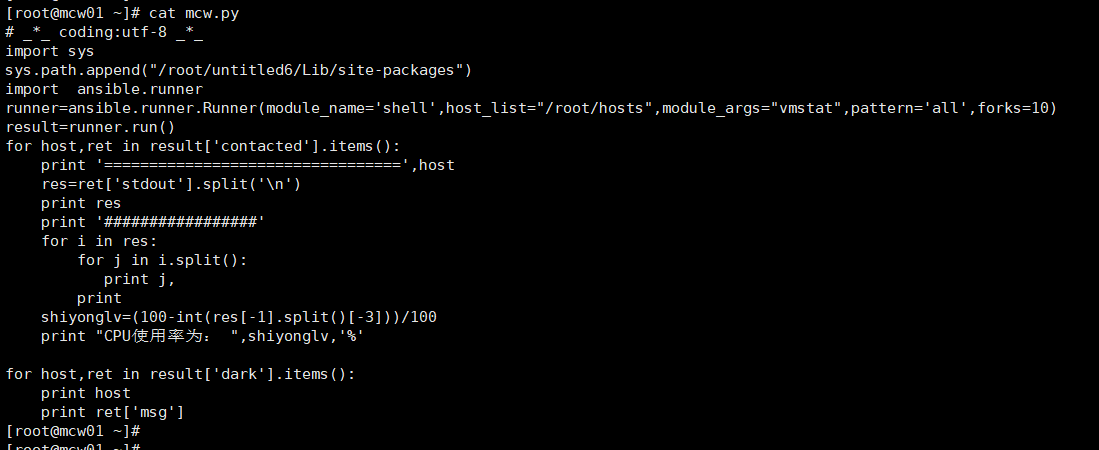

api将返回数据按行和列封装到对象或者字典中
如果我们需要多个返回的数据。我们可以将数据分别保存到对象中或者时字典中,分别需要定义类和字典
ansible api调用及二次封装详解的更多相关文章
- 利用 Java 操作 Jenkins API 实现对 Jenkins 的控制详解
本文转载自利用 Java 操作 Jenkins API 实现对 Jenkins 的控制详解 导语 由于最近工作需要利用 Jenkins 远程 API 操作 Jenkins 来完成一些列操作,就抽空研究 ...
- vc中调用Com组件的方法详解
vc中调用Com组件的方法详解 转载自:网络,来源未知,如有知晓者请告知我.需求:1.创建myCom.dll,该COM只有一个组件,两个接口: IGetRes--方法Hello(), IGet ...
- Java进阶(三十二) HttpClient使用详解
Java进阶(三十二) HttpClient使用详解 Http协议的重要性相信不用我多说了,HttpClient相比传统JDK自带的URLConnection,增加了易用性和灵活性(具体区别,日后我们 ...
- 转:JAVAWEB开发之权限管理(二)——shiro入门详解以及使用方法、shiro认证与shiro授权
原文地址:JAVAWEB开发之权限管理(二)——shiro入门详解以及使用方法.shiro认证与shiro授权 以下是部分内容,具体见原文. shiro介绍 什么是shiro shiro是Apache ...
- php调用C代码的方法详解和zend_parse_parameters函数详解
php调用C代码的方法详解 在php程序中需要用到C代码,应该是下面两种情况: 1 已有C代码,在php程序中想直接用 2 由于php的性能问题,需要用C来实现部分功能 针对第一种情况,最合适的方 ...
- 2017.2.9 深入浅出MyBatis技术原理与实践-第八章 MyBatis-Spring(二)-----配置文件详解
深入浅出MyBatis技术原理与实践-第八章 MyBatis-Spring(二) ------配置文件详解 8.2 MyBatis-Spring应用 8.2.1 概述 本文主要讲述通过注解配置MyBa ...
- Azure Terraform(二)语法详解
一,引言 上篇文章开始,我们简单介绍了以下通过基础设施管理工具----- Terraform,通过它来统一管理复杂的云基础设施资源.作为入门演示,使用Terraform 部署Azure 资源组的方式直 ...
- 18.Java 封装详解/多态详解/类对象转型详解
封装概述 简述 封装是面向对象的三大特征之一. 封装优点 提高代码的安全性. 提高代码的复用性. "高内聚":封装细节,便于修改内部代码,提高可维护性. "低耦合&quo ...
- Python3调用C程序(超详解)
Python3调用C程序(超详解) Python为什么要调用C? 1.要提高代码的运算速度,C比Python快50倍以上 2.对于C语言里很多传统类库,不想用Python重写,想对从内存到文件接口这样 ...
- Java面向对象之封装详解
封装详解 封装 该露的露,该藏的藏 1.我们程序设计要追求"高内聚.低耦合".高内聚:类的内部数据操作细节自己完成,不允许外部干涉:低耦合:仅暴露少量的方法给外部使用. 封装(数据 ...
随机推荐
- OpenHarmony装饰指定自定义组件:@BuilderParam装饰器
当开发者创建了自定义组件,并想对该组件添加特定功能时,例如在自定义组件中添加一个点击跳转操作.若直接在组件内嵌入事件方法,将会导致所有引入该自定义组件的地方均增加了该功能.为解决此问题,ArkUI ...
- winrt新dx截图最小实现
转自:https://stackoverflow.co/questions/11283015 效果还是很不错的 #include <iostream> #include <Windo ...
- Visual Studio 2022插件的安装及使用 - 编程手把手系列文章
这次开始写手把手编程系列文章,刚写到C#的Dll程序集类库的博文,就发现需要先介绍Visual Studio 2022的插件的安装及使用,因为在后面编码的时候会用到这些个插件,所以有必要先对这个内容进 ...
- PMF源解析技术在大气颗粒物与VOCs研究中的创新应用
目前,大气颗粒物和臭氧污染成为我国亟待解决的环境问题.颗粒物和臭氧污染不仅对气候和环境有重要影响,而且对人体健康有严重损害.而臭氧的前体物之一为挥发性有机物(VOCs).为了高效.精准地治理区域大气颗 ...
- openGauss单机部署
openGauss 单机部署 一.安装环境 操作系统:虚拟机 VMware.CentOS7.9 环境设置: (1)虚拟机内存 3G.磁盘 100G (2)系统版本修改 一开始使用了 centos8,无 ...
- ThinkPHP6.x 使用指南
PHP 版本:PHP 8.1.0 框架版本:ThinkPHP 6 编辑工具:PHPStorm 2021.3.3 系统环境:Windows 10 0x01 概述 (1)简介 ThinkPHP 框架简称 ...
- allure常用
overview:概述页面:categories:分类目录:suites:按套件和类分组的已执行测试的标准结构:graphs:图表:timeline:时间线:behaviors:可根据epic.fea ...
- 常用注解使用总结系列: @Order 注解
@Order 注解 @Order注解主要用来控制配置类的加载顺序示例代码: package com.runlion.tms.admin.constant; public class AService ...
- springboot获取七牛云空间文件列表及下载功能
原文摘自:https://www.codernav.com 第一步:新建springboot项目,引入jar包,其中hutool-all是工具类,用来写文件下载,可以随意更换. <!--工具类- ...
- Java集成系列:高效构建自定义插件
前言 随着软件开发的快速发展和需求的不断增长,开发人员面临着更多的压力和挑战.传统的开发方法需要花费大量的时间和精力,而低代码开发平台的出现为开发人员提供了一种更加高效.快速的开发方式.今天小编就以构 ...
